How Riverboat Gambling Became Riverboat Gaming
Kevin has been involved in the gambling industry since the ‘80s. From winning tournaments to casino management, he’s ultimately done it all. Throughout the years, he’s written for various iGaming publications on topics such as the legal landscape of online casinos and strategies behind winning. His favorite game is blackjack.
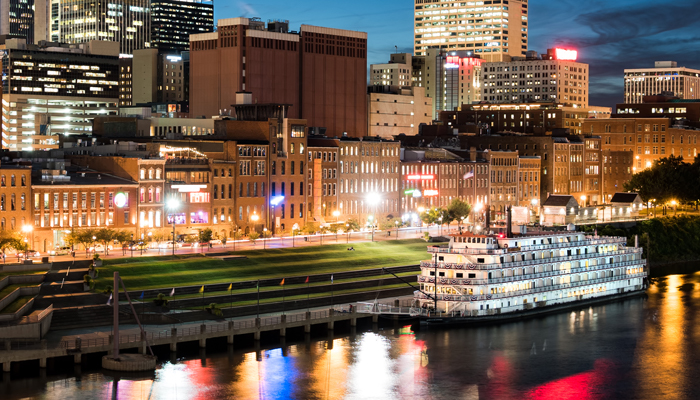
Cash-strapped states across the South and Midwest in the late eighties and early nineties were desperate for a new source of cash revenue that didn’t raise taxes. Gambling seemed like an easy way out, but it was going to be a hard sell to dubious voters.
But what if they used the allure of the old riverboat gambling myths and the promise of using the riverboat casinos to keep the gambling scourge at arm’s length from impacted communities? Could they sell this new, sanitized riverboat gaming to their constituents?

The Evolution of Gaming on America’s Rivers
We will explore the history of riverboat gaming in America from the early 19th century right into the 21st. We will discuss how it morphed and was delicately managed to become a product that a broad number of people could support a few decades ago, before starting another slow decline, and we take a closer look at some of its few bright remaining stars.
- ⛴ The History of Riverboat Gambling
- ⛴ The Beginnings of Riverboat Gaming
- ⛴ A Few of the Best Riverboat Casinos Remaining
- ⛴ Conclusion
The History of Riverboat Gambling
The first steamboat to make the trip down the Ohio and then the Mississippi was aptly named New Orleans, and she made her inaugural trip in 1811. For the next 100 years, these boats would define commerce along the nation’s mighty rivers. And with commerce comes con men.
The huge sums of money that came from moving much of the fledgling nation’s goods up and down the rivers would prove to be a powerful temptation. While much of the gambling that soon developed on these long, slow trips along the river was legal, many of the men who came to play were on the wrong side of the law .
Not even two decades into the new steamboat trade and there were articles in the Eastern papers about the con men, card sharps, and confidence scams being run on every bumpkin that set foot on a boat. In 1835, the townsfolk in Vicksburg had had enough; they lynched 5 of the “professional gamblers” and burned every Faro table in town, which was stated to be in the dozens.
Much like the frontiersman who preceded them and the Wild West lawmen who would come later, these sharply dressed, supremely confident riverboat gamblers who plied their way on the steamboats of the Mississippi using only their luck and some “skills” they’d picked up along the way were the subject of many salacious headlines and stories in their day. Despite their many obvious flaws, an almost reverence was bestowed on them as archetypical American heroes.
The Beginnings Of Riverboat Gaming
The hay day of the Riverboat gambler started to fade in the 1860s during the Civil War, and then with the advent of railroads, they were soon all but forgotten. But in the early 1990s, states desperate for tax revenue and looking at the success of Las Vegas and Atlantic City decided to retest the waters of riverboat gambling.
This time, it was a way of introducing limited casino operations only along the waterways of the State’s rivers, selling it to their constituents as a diversion and pastime. Thus, the term riverboat gaming was needed . This was to be entertainment and frivolity, none of those card sharps and hustlers from the good ole days. So, a new term was coined.
Iowa led the riverboat race with the Diamond Lady in Bettendorf in April 1991. But riverboat gaming would soon come to Illinois, Mississippi, Missouri, Louisiana , and other states along the Mississippi and other large rivers like the Missouri and Ohio and even the Fox and Red Rivers.
Used mainly as a stalking horse for the eventual opening of land-based casinos in most of these states, many gamblers found the cramped quarters, the limited selection of slots and tables, and most egregious of all, the ability to only embark or disembark while the boat was at the pier, to be a let down from the Las Vegas style experience that they had been promised.
In Iowa, the first land-based casinos made an appearance in just three years. In every State, some accommodations were made , from no longer having to cruise the dangerous rivers to being allowed to move on to barges over the river to being able to move to land as long as you were adjacent to the river. This was a push generally called dock-side gaming, which meant that the actual return of elegant paddle wheelers with blackjack, roulette, and slot machines prowling the Mississippi again lasted less than a decade.
Dock-side gaming was far safer and allowed gamblers to come and go as they pleased , which drove casino revenues much higher. Also, the ability in some states to move either onto barges or land-based casinos adjacent to piers saw some spectacular casinos get built that could finally meet the promise of a Las Vegas experience.
A Few Of The Best Riverboat Casinos Remaining
If you are going to visit one of the grand old ladies of the river, we think that you should start with the actual riverboats that once traveled the Mississippi, and of these, the Amelia Belle is one of the most iconic .
Situated about an hour and a half outside New Orleans, deep in Cajun Country, this beautiful riverboat gambling hall has over 30,000 square feet of gaming space , 800 slots, and a dozen table games. Before she was damaged during Hurricane Katrina, she sailed up the river from the port of New Orleans several times a day in the mid-90s, but she now sits permanently in Bayou Bouef, her expedition days behind her.
Since Louisiana has kept its premise of at least gambling on a boat, even if its moored in a giant pool or cemented to the dock, longer than most other of the original riverboat casino states, it’s no wonder we can find most of the truly breathtaking and best riverboat casinos there.
Another of the must-see gambling boats sits on the Red River in Shreveport, Louisiana. Chosen for its 20-minute proximity to the Texas border and only two and a half hours drive from Dallas, Shreveport was once a thriving riverboat gambling town and one of the country’s premier riverboat casino locations. But the Indian tribes in Oklahoma, which sit only an hour outside of Dallas to the North, have taken some of their business.
Still, there are several other riverboats operating in Shreveport, but what we think makes the Sam’s Town Property, one of the best riverboat casinos in Louisiana , is that they’ve turned a 30,000-square-foot gaming boat into a destination resort. They have a 500+ room hotel directly adjacent and tied into the property with four restaurants including a really nice steak house and lots of other amenities. The boat itself has over 1000 slots and more than 27 table games.
One of the best riverboat casinos outside of Louisiana is the Grand Victoria in Elgin, Illinois. Built back in 1995, she was spared the dangers of cruising the Fox River in 1999, when Illinois was one of the last states to end their riverboat gaming rules that required the boats to leave their docks. Today, this 30,000-foot boat has room for 1100 slots and almost 30 tables and even sports an onboard buffet and three other restaurants. She is one of the prettier examples of the early 1990s boats that you will see as well, and it is well worth your time to get a good vantage point and take in her lines.
While both the age of riverboat gamblers and its more recent short-lived renaissance of riverboat gaming are now a thing of the past, the allure of cruising the mighty Mississippi while making your living playing cards and shooting dice will probably live on into the distant future. There is something about the water flowing past and the land slipping by out the window that just seems to call for a quick hand of poker or a spin on the roulette wheel.
It’s a call back to a time when the men and women who traveled these waterways were used to risking everything in order to follow their dreams. Get out there and check out some of those boats, wander the decks, play a hand or two of blackjack, and contemplate that river streaming by while you still have a chance to see a dying American breed , the last of the riverboat casinos.

- Terms & Conditions
- Golden Nugget
- Online Slots
- Online Baccarat
- Online Blackjack
- Online Roulette
- Casino Guides
- Destinations
The Legacy and Historical Influence of Riverboat Casinos in the United States

Welcome aboard as we set sail into the captivating world of riverboat casinos in the United States . On this page, we’ll walk you through their legal status and historical implications, explore the where, what, and why of these floating gaming venues, and finally, take a close look at the modern condition of riverboat gambling.
As we explore the ins and outs of this unique chapter in American gaming history, we’ll also take a glance at if riverboat casinos have left a mark on the WV online gambling scene and gambling in the US in general.
- Legal Status of Riverboat Gambling
- Boat Casinos Regulation in Various States
- History of Riverboat Gambling
- Popular Riverboat Casinos
The Legal Status of Riverboat Gambling
Historically, casino boats were allowed in many states, mostly those with access to the Mississippi River. Today, only six states still allow this form of gambling:
Mississippi
Gambling boats are essentially floating casinos operating on designated waterways . They offer a wide variety of gambling activities just like land-based casinos, including slots , table games , and poker .
Each state with legal riverboat gambling has its own regulatory body responsible for licensing and ensuring compliance with state laws and regulations. These regulations typically address aspects such as gambling activities allowed, revenue sharing with the state, security measures, responsible gambling practices, and environmental considerations.
While sharing similarities with land-based casinos, riverboat casinos face additional regulations due to their unique setting, such as:
- Licensing requirements . Land-based casinos typically have more stringent licensing requirements than riverboat casinos. For instance, land-based casinos may be required to undergo a more rigorous background check and financial audit process compared to riverboat casinos;
- Location restrictions . There are usually fewer restrictions on riverboat casino locations than on those of the brick-and-mortar venues. For instance, land-based casinos might not be allowed to operate in certain areas, such as residential neighborhoods or near schools. Riverboat casinos, in turn, are more flexible when it comes to location, as they can be moored on rivers that flow through various areas;
- Taxation . The taxation of land-based casinos and riverboat casinos can vary depending on the state. In some cases, land-based casinos may be subject to higher tax rates than riverboat casinos;
- Building codes . Land-based casinos are typically required to meet more stringent building codes than riverboat casinos. This is because land-based casinos are permanent structures, while riverboat casinos are considered temporary structures;
- Inspection and enforcement . Land-based casinos usually undergo more frequent inspections and stricter enforcement of regulations compared to riverboat casinos.
Generally, the regulation of land-based casinos tends to be more strict and comprehensive than the regulation of any casino on the Mississippi River . The reason is likely that land-based casinos are considered to have a greater impact on the surrounding community , both in terms of economic benefits and social costs.
State-by-State Riverboat Gambling Regulations
As of 2024, it’s legal to run and visit a riverboat casino in six states. Let’s take a closer look at each of them:
Here, riverboat casinos are allowed on the Mississippi River , the Illinois River , and the Des Plaines River . The casinos must be located at least 300 feet from the shore and be accessible to the public by land or water . Riverboat casinos in Illinois are regulated by the Illinois Gaming Board .
In Indiana, boat casinos can operate on the Ohio River , the Indiana Harbor , and the Patoka Lake Reservoir . They must be located at least 600 feet from the shore . Riverboat casinos in Indiana are regulated by the Indiana Gaming Commission .
In this state, it’s legal for riverboat casinos to operate on the Mississippi River and the Missouri River . They must be located at least 300 feet from the shore and are regulated by the Iowa Racing and Gaming Commission .
A riverboat casino in Louisiana is allowed to operate on the Mississippi River , the Red River , and the Gulf of Mexico as long as they are located at least 300 feet from the shore . The casinos here are regulated by the Louisiana Gaming Control Board .
Obviously, a riverboat casino in Mississippi can be located on the Mississippi River at least 300 feet from the shore . Boat casinos in Mississippi are regulated by the Mississippi Gaming Commission .
Last but not least, Missouri riverboat casinos are allowed on the Mississippi River and the Missouri River at least 300 feet from the shore . Riverboat casinos in Missouri are regulated by the Missouri Gaming Commission .
Brief History of Riverboat Casinos
Explore the history of riverboat casinos in the United States, tracing their origins, development, and impact on both the gambling industry and American culture.
19th Century: The Origins of Riverboat Gambling
The roots of riverboat gambling can be traced back to the 19th century when steamboats were the primary mode of transportation along the Mississippi River. As passengers went on long journeys, gambling became a popular pastime to pass the time. While gambling activities were generally illegal on land at that time, boats provided a loophole, as they were considered to be outside of state jurisdiction.
Early 20th Century: Decline and Revival
The invention of railroads in the early 20th century led to a logical decline in riverboat travel, and respectively, riverboat gambling. However, the 1970s saw a reappearance of interest in riverboat casinos, primarily because of the push to revitalize urban areas.
1990s: Expansion and Legalization
The 1990s marked a period of significant growth for riverboat casinos. Several states legalized riverboat gambling, and the industry expanded rapidly. By the late 1990s, there were over 150 riverboat casinos operating in the United States.
2005: Hurricane Katrina and Its Devastating Blow
In August 2005, Hurricane Katrina struck the Gulf Coast, causing widespread destruction and displacement. The storm severely impacted the boat casino industry in Mississippi and Louisiana, with several casinos suffering significant damage or complete destruction.
Late 2010s: Post-Katrina Recovery and Adaptation
The consequences of Hurricane Katrina brought significant changes to the riverboat casino industry. While some casinos managed to rebuild and reopen, others had to close permanently. The industry also faced increased competition from brick-and-mortar casinos, which were gaining popularity at that time.
Today: A Mature Industry
Today, a casino boat remains a popular form of entertainment in the United States. However, the industry has matured and consolidated, with the number of riverboat casinos decreasing in recent years. Despite these changes, riverboat casinos continue to be an important economic driver in many regions.
Popular Riverboat Casinos in the US
Now that we know all the theory about riverboat gambling, let’s get to practice and take a look at the most popular water casinos in the United States.
The Grand Victoria Casino – Elgin, Illinois
Located along the beautiful Fox River, The Grand Victoria Casino is a home (or rather a boat) of true gaming elegance. Known as the largest riverboat casino in Illinois, it boasts an impressive 65,000 square feet of gaming space including slots, table games, and a poker room. The casino also offers a variety of dining and entertainment options, including a steakhouse, a buffet, and a concert venue.
Ameristar Casino Vicksburg – Vicksburg, Mississippi
The Ameristar Casino Vicksburg is one of the oldest and most crowded riverboat casinos in Mississippi with over 50,000 square feet of gaming space . The wide choice of slots, table games, and poker tables is complemented by all kinds of entertainments, from the flavors of a diverse buffet to comedy clubs and nightclubs.
Horseshoe Casino – Bossier City, Louisiana
The Horseshoe Casino is one of the largest riverboat casinos in Louisiana and one of the most popular. It features over 100,000 square feet of gaming space , including slots, table games, and a poker room. The casino also offers a variety of dining and entertainment options, so players can choose between a steakhouse, a buffet, a concert venue, and others.
Sam’s Town Casino – Shreveport, Louisiana
Sam’s Town Casino is a popular destination for all kinds of gaming enthusiasts in and out of state. With a gaming space of over 34,000 square feet , this casino offers an intimate yet exhilarating experience. Beyond the slots, table games, and poker room, Sam’s Town welcomes gamers to savor a culinary journey with a steakhouse, a buffet, and a unique entertainment experience at the in-house bowling alley.
What is the Diamond Lady casino boat?
The Diamond Lady Riverboat Casino was a paddlewheel riverboat casino that operated on the Mississippi River in Bettendorf, Iowa, from 1991 to 2008. In 2021, the Diamond Lady sank during a severe winter storm. It was later raised and brought to shore, where it remains today. The future of the Diamond Lady is uncertain, but it is possible that it will be restored and reopened as a casino or museum.
Why do casinos have to be on water in the US?
Casinos in the US don’t necessarily have to be on the water, but there are some casinos that are. This practice originated when gambling laws were more restrictive on land, and the association of riverboat gambling with waterborne transportation became a legal requirement in some states.
Why are casinos on the water so popular?
Riverboat casinos are popular for their unique charm and historical allure. The on-water setting offers players a distinctive and memorable gaming experience, contributing to the popularity of these establishments. Additionally, the regulations associated with riverboat gambling create a controlled and regulated environment that appeals to both operators and players.
Most Recent

Join our subscription list to get access to new bonus offers, online casino reviews, and industry news all in one newsletter!

History of Riverboat Gambling on the Mississippi

The South has always been at least somewhat friendly to gambling due to the rise of the riverboat in the early 1900s. Games of chance were kept on the water so that anti-gambling laws wouldn’t apply. Games like poker and roulette took place on grand riverboats, even if the ship never left the dock.
This tradition was greatly reduced when the railroad became the main way to transport both goods and people, but some riverboats remain in the South today. In Mississippi and Louisiana, especially, retired steamboats are now used for river cruising and for gambling in places like Vicksburg.
Online casinos are one of the latest innovations in the casino industry. Since the rise of technological advancements, they are solid competitors to U.S.-based land-based casinos. Many gambling restrictions still remain in the South and across the ocean. For example, every casino in the UK gets licensed by the UK Gambling Commission.
The regulations of the U.S. online casino market have led to developers existing who only get associated with U.S. casinos and are not available at UK-based gaming sites. Some famous developers for the U.S. market are RealTime Gaming, Relax Gaming, Rival Gaming, Elk Studios and Betsoft.
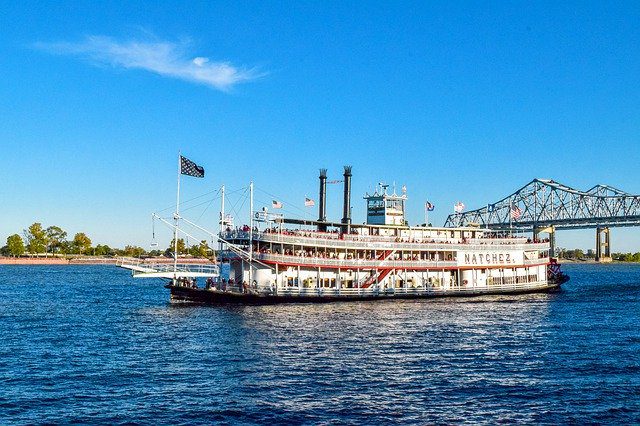
But for those players who want the old-time experience of dressing up and boarding a grand steamboat, the South has plenty for them. Just look along the Mississippi River from Missouri to Louisiana. According to Visit Mississippi , the first steamboat to travel the Mississippi River was the New Orleans, whose October 1811 maiden voyage began in Pittsburgh, Pennsylvania. The New Orleans stopped in Natchez in December 1811 before continuing to its final port in New Orleans.
Wealthy Southerners could afford to travel by steamboat, and some were ornately decorated in the Victorian style. The riverboat casinos that remain today continue that grand tradition, with music playing onboard, restaurants available to players and even live entertainment offered regularly.
So, if you want to step back in time and experience the old South by river—without all the outlaws and pirates —consider a riverboat cruise or evening of gaming.
SHARE THIS STORY:
Eco-conscious travel, the wild history of, related articles.

3 Must-Visit Histori

6 Creative Trips Thr

Best Photo Spots in
No comments, leave a comment cancel reply.
- CRUISE TIPS
- Carnival Cruise Line
- Celebrity Cruise Line
- Disney Cruise Line
- Holland America Line
- MSC Cruises
- Norwegian Cruise Line
- Princess Cruises
- Royal Caribbean
- Virgin Voyages
- Windstar Cruises
- Travel Deals
- CRUISE SHIP TRACKER
- Port Webcams

There are various areas of the world that just seem synonymous with gambling. When people hear the name Las Vegas they picture gambling of a flashy, mass entertainment proportion. Macau ’ s gambling culture brings a real Asian flavour to gambling, with many inevitably comparing it to Vegas. Monte Carlo delivers gambling connotations of wealth and prestige. Obviously, it is not just physical areas where gambling has a strong presence, with the web and mobile space being dominated by PartyCasino and other big names in the industry.
Another, yet somewhat less spectacular, sight that can only be associated with gambling is the steam propelled riverboat of certain states in the USA. How did these iconic vessels come to be known for hosting casinos, and what is the current status of riverboat casinos today?
On Water, But Not Land
There is a network of rivers that penetrate inland from the Gulf of Mexico up through the United States, most famously the Mississippi River . In the 19 th Century the rivers provided a fantastic way to transport goods from town to town up and down the bodies of water. This in turn became a popular method of passenger transport, with travellers using the boat to socialise. One of the most popular forms of entertainment was play at online Irish casino , and therefore this pastime became highly popular aboard the vessels.
There were also, and still are today, laws that prohibited gambling on land. However, the proprietor s of these boats took advantage of the loophole not extending these laws to establishments on water. Even today, riverboats are still to be found on the Mississippi and is still considered one of the best for cruises. Certain rivers acted as state lines, so it was sometimes argued that the gamblers could not be classified as being in one state or another while steaming down a river.
Railroads and War
As mentioned, the riverboats were first and foremost a means of transportation and enjoyed such success due to it being the quickest and most reliable means of travel and delivery of goods. However, when railroads started to spread across the country, they opened up new routes that got people around in a more direct manner. The trains also cut days off travel and therefore started to overtake the riverboats in popularity.
Around the same time the American Civil War broke out, a period where much of the fighting was done in the Southern States which defied the laws laid out by the North. This meant that riverboat entertainment almost came to a complete end.
The Riverboats of Today

Unlike the boats of old, which used to set off on long journeys to various destinations, the vessels of now mostly remain docked and very seldom actually take to the open waters. However, one will still be able to undergo the traditional experience that thousands enjoyed before casinos became what we are familiar with today.

- #RiverCruise

Related Articles
First look: disney imagination garden to bloom with boundless storytelling onboard disney adventure, sailing from singapore in 2025, oceania cruises’ 2025 grand voyages unveils immersive 2025 grand voyages, how to find vegan-friendly restaurants when traveling, get the cruise addicts newsletter free.
Stay in the loop with the latest cruise news, tips, and reviews directly to your inbox.
Latest Articles
How to rent a car without a credit card, viking silver spirits package guide (2024).
© Copyright 2024 - Cruise Addicts
- Affiliate Disclaimer
- Privacy Policy
A Guide To The Most Iconic Riverboat Casinos In The US
- MEET THE TEAM
- PRIVACY POLICY
- TERMS OF USE

Talk about casino destinations and you’ll most likely think of Las Vegas, Atlantic City or, if you are travelling outside the US, maybe Monaco or Macau.

Yet what are called “land based” or “bricks and mortar” casinos to differentiate them from the online versions are not necessarily on land or made of bricks and mortar.” To: “Yet what are called “land based” or “bricks and mortar” casinos to differentiate them from the online versions like 1xbet India online casino, are not necessarily on land or made of bricks and mortar.
We refer, of course, to riverboat casinos, a little slice of Americana that’s as American as Super Bowl Sunday or Thanksgiving turkey. Riverboat casinos conjure up images of the Mississippi and Mark Twain complete with white suit, top hat and cigar. There are more than 60 riverboat casinos operating in the USA and every single one of them has a story to tell. Here, we highlight a handful of the very best.
The Grand Victoria, Elgin
Our first stop is not on the Mississippi at all, but on the Fox River in Elgin, 50 miles north west of Chicago . Owned and operated by Caesars Entertainment, the Grand Victoria really is a slice of Las Vegas on the Illinois waterfront. With more than 1,000 slots and video poker terminals and 36 tables, there’s a great choice of games.
If all that gambling whets your appetite, there are four dining options on board, including the highly rated Buckingham’s Steakhouse and Lounge.
Casino Queen, Marquette
The Casino Queen would look like a lifeboat if it was moored alongside the Grand Victoria, but that is all part of its charm. It offers a more intimate and personalized experience, and although there are only eight tables, they host an intriguing variety of games that are not commonly found in land (or water) based casinos. If you know how to gamble online in the US , you’ve probably seen fusion blackjack and 21+3 at US online casinos. The Casino Queen gives you an opportunity to play them in real casino surroundings.
When you step ashore, there is an adjacent 31-acre entertainment complex with a variety of attractions and a huge choice of dining options.
The Amelia Belle, Amelia
At last, we arrive in Louisiana, where the Amelia Belle lies nestled in the Avoca Island Cutoff waterway. This classic four-story riverboat looks like it has stepped straight out of a photograph from the turn of the 20 th century. When it is lit up at night, it takes your breath away.
At the tables, poker is the order of the day. The casino offers Mississippi stud, 3-card poker and Texas Holdem. There are also 800 slot games, while the Fanduel sportsbook has self-service betting kiosks, a wall full of television screens, and a huge video wall to show the biggest events.
Sam’s Town, Shreveport
On the opposite side of Louisiana, Sam’s Town could not be more different to the Amelia Belle. This floating leisure complex houses a hotel, health spa, sauna and live entertainment venue.
The casino offers more than 1,000 slots and 30 table games that include blackjack, roulette, baccarat, Let it Ride and Craps No More.
Team JST work with our sponsors, shop vendors, and many more to create informative and engaging content.
Jetset Times in your inbox
By signing up, you agree to our Privacy Policy and European users agree to the data transfer policy.

Top Luxury Travel Destinations For 2024-25

How To Keep Yourself Entertained On Long Bus Rides

5 Ways To Pass The Time During A Long Layover

The Top 7 Best Casinos In The US: Ultimate Traveler’s Guide

Maximizing Your Trip To Vegas
A former photographer, Jonathan has written extensively about the gambling industry over the last few years. Though perfectly happy chatting at a gaming trade show or lounging in the casino, his favorite place is on a motorcycle with his trusty hound, Yol...
- Riverboat Gambling: A Taste of the Past /
Riverboat Gambling: A Taste of the Past
- September 24, 2020 04:34PM
- September 24, 2020
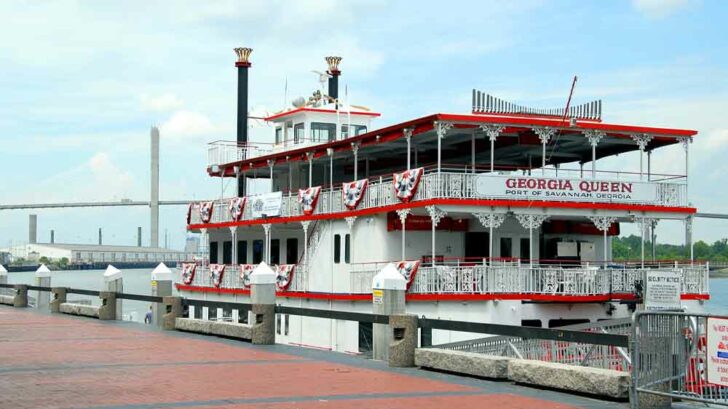
Introduction: Riverboat Gambling
Have you ever been riverboat gambling? We’ve all seen the old photos of these majestic looking paddle steamers making their way up the Mississippi River. In fact, it’s probably considered an image that pretty much sums up the golden age of the Wild West, once it was tamed. But things have moved on a bit since those days of gun-toting cowboys and Stetsons. Though gambling may have advanced in some areas, like the internet, it doesn’t necessarily follow that this holds true of every state in the US. For example, did you know that some states still require that all gambling takes place on a riverboat? Sounds crazy…so let’s have a look.
The Wild Midwest
The origins of riverboat gambling are pretty straightforwards. As the West was expanding, many merchants had to travel considerable distances in order to both maintain and find new business. Back in the 1800s, they made use of the extensive waterways that zigzagged across the eastern seaboard to the mid-west. so traveling by boat was the norm. Unfortunately, this form of travel is also exceedingly time-consuming.
Essentially we had a bunch of rich folks, with lots of time on their hands, and all stuck on a boat. So it’s no surprise that riverboat gambling quickly became the best method to pass the time. And of course, the smell of easy money brought professional gamblers to the party. Soon any number of shady characters could be found gambling on these boats. But laws were changing, and many states were actively outlawing all forms of gambling. At the same time, there were a great many people complaining about the card sharps. Soon lynch mobs sprung up to dish out “justice” to card cheats. It was all getting out of hand.
Riverboat Gambling: Caught In The Middle
So, with the police on one shore and the lynch mob on the other, it’s no surprise that riverboat gambling felt a lot safer whilst remaining on the waterways. These boats gave an opportunity to the very best card sharps to practice their trade with impunity. But times were a-changing, and it was only a matter of time for things to change thanks to the introduction of the railroads. Overnight, the riverboats became redundant for traveling purposes. But the story doesn’t end here.
States are always on the lookout for means of raising their own taxes. And all states were looking westwards and seeing the sheer amounts of cash pouring into the coffers of the State of Nevada, thanks to it’s relaxing of gambling laws allowing all types of jackpot games . And so, it only natural that they too, wanted some of that action. So states that were on the Mississippi River began to think again about utilizing those paddle steamers as floating gambling casinos. This would create an important source of additional state revenues. So, with the stroke of a pan, laws were changed and those boats were recommissioned. Well not quite.

Modern Riverboat Gambling Casinos
The thing is that though they might be called riverboat gambling casinos, the “boat” bit can be a bit misleading. Often they really have nothing in common with a real boat. Most of them are just floating structures, which happen to be parked on the waterway. They do appear to be floating, but we wouldn’t be surprised if they were not built up from the river bed itself. When these new riverboats first appeared, it was when the idea of gambling once again was starting to take it’s first baby steps. As a result, gambling laws were extremely restrictive. Most boats had a $5 betting limit and there were rules as to how much a guest was allowed to lose on a single trip.
But the 1990s saw a major change in gambling laws. Things became more relaxed and as a result, revenues increased for casinos, which in turn led to states gaining more as well. As of today, riverboat gambling casinos to win the jackpot operate in 6 states, Louisiana, Mississippi, Iowa, Missouri, Indiana, and Illinois. But that doesn’t mean that they all follow the same laws. For example, in Louisiana, all casinos must actually look like the old river paddleboat steamers and have their own engines. Then again, not all river states have even joined the gambling party. So Kentucky, Arkansas, Wisconsin, Tennessee, and Minnesota have no river casinos at all. It’s really strange that voters wouldn’t want the extra income that gambling brings.
Riverboat Gambling: Boosting Local Economies and State Budgets
It goes without saying that riverboat gambling had has a positive impact on both local level and state budgets. For example, in Indiana, all casinos have to pay a 20% state tax. Of this, 15% goes to the state and the other 5% remains in the local community. Just so there’s no doubting the numbers involved, this translates to a staggering $400 million to the state and $80 million locally. In fact, more tax money flows into the state from riverboat gambling, than from any other source. And it, not only tax money that’s important. These huge floating monstrosities need workers. They need to hire dealers, waitresses, accountants and security, and more.
And the vast majority of these workers are going to be people who live locally. As a direct result, this increases the amounts of money going into local communities, as workers are spending salaries in shops and stores where they live.
King Billy Casino Welcome Bonus
151% match bonus up to €500 + 51 bonus spins, when winstar came to thackerville.
A great example of this effect would be what happened in Thackerville. This was a quiet backwater of a town with few inhabitants and just the river flowing slowly by. it’s the type of young that young people look forwards to escaping from as soon as high school is over. But then WinStar World Casino decided to plonk a massive riverboat gambling casino there. Before you could say “bingo”, Thackerville was suddenly on the map. The casino started to instantly pull thousands of tourists in from all over the adjoining states. Not only that, but it created literally thousands of jobs. The town had gone from being a sleepy village into a bustling town in less time than to spin a roulette wheel.

Our Favorite Riverboat Casinos
Sam’s town – shreveport, la.
This casino is familiar to all gamblers who go to Las Vegas. In fact, it’s been a gambling institution for many years now. It’s situated on the shores of the muddy Mississippi River. It has all the luxuries you’d expect from a historic casino in Vegas. There’s a spa for relaxing in after a hard day at the slots. These, by the way, are all joined together to create a local progressive jackpot of around $80,000.
Casino Queen Marquette – Marquette, IA
If you’re not a high roller, but want the high roller experience, then look no further than the Casino Queen. This is a relatively small casino floating on the Mississippi. There are just 8 gaming tables, which is tiny when you think of even the smallest venue in Las Vegas. But what they lack in table games, they certainly make up for with jackpot slots machines. There are a staggering 1,100 machines to choose from. But the main feature that makes the Casino Queen so outstanding, is the staff. You’ll be hard pushed to find a more courteous and helpful staff as they have there. The level of service is second to none.
The Grand Victoria Casino – Elgin, IL
Just a short 40-mile drive going west out of Chicago, and there you’ll find the Grand Victoria Casino Elgin. A medium-sized venture, it has 36 games tables. And a whopping 1,000 slot machines to help increase your jackpot winning chances . But the casino isn’t just famous as a riverboat gambling venue. The owners place great emphasis on giving back to the community via various outreach programs. In fact, this being the highest-grossing casino in the state, it still manages to give away a huge part of it’s profits to the surrounding communities. So, if you happen to be playing there, be happy in the knowledge that part of your losses is going to good causes.
Conclusion: Riverboat Gambling
By their very nature, riverboat casinos can’t compete when it comes to the level of luxury found in land-based casinos. But what they don’t have in glitz, they certainly make up for with charm. And that’s a timeless old-world charm that’s hard to duplicate. Though these river paddle boats don’t actually move (thought here are some that do), there’s still a decidedly old fashioned feeling from gambling on the river. We suggest that they’re great to visit and play in, if nothing but for the change and the experience from your regular land-based casinos. You’ll be glad that you did.
Click here to visit King Billy Casino for fun-filled games!
About the Author
// More From jonathan

How To Find Gambling Success With Development Philosophies

The Top Most Exciting Horse Racing-Themed Slot Games

A Complete Guide To The Tour De France

Can Adult-Centred Las Vegas Ever Be Family Friendly?

Japan’s First Casino Get The Go Ahead In Osaka

A Complete Guide To Winning The Lottery Online
// Recommended by Experts


1xBET Sportsbook
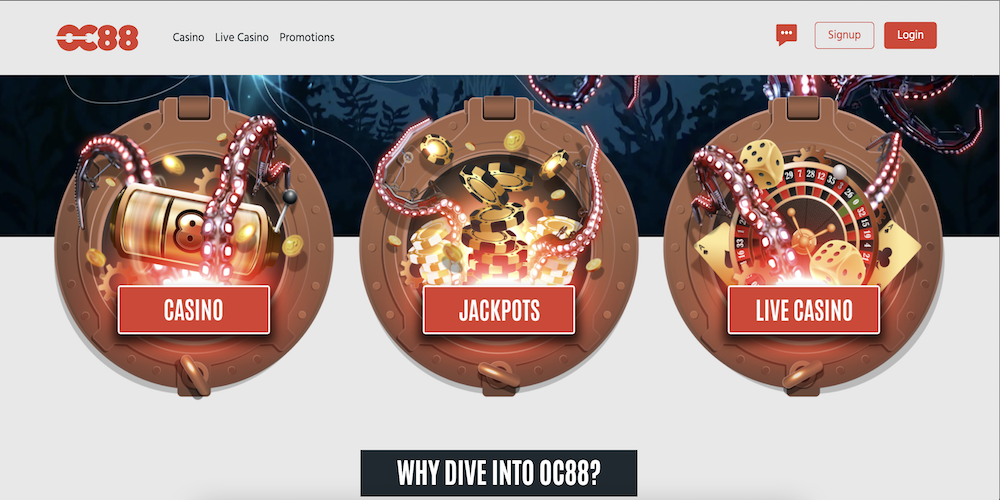
OC88 Casino

22Bet Casino
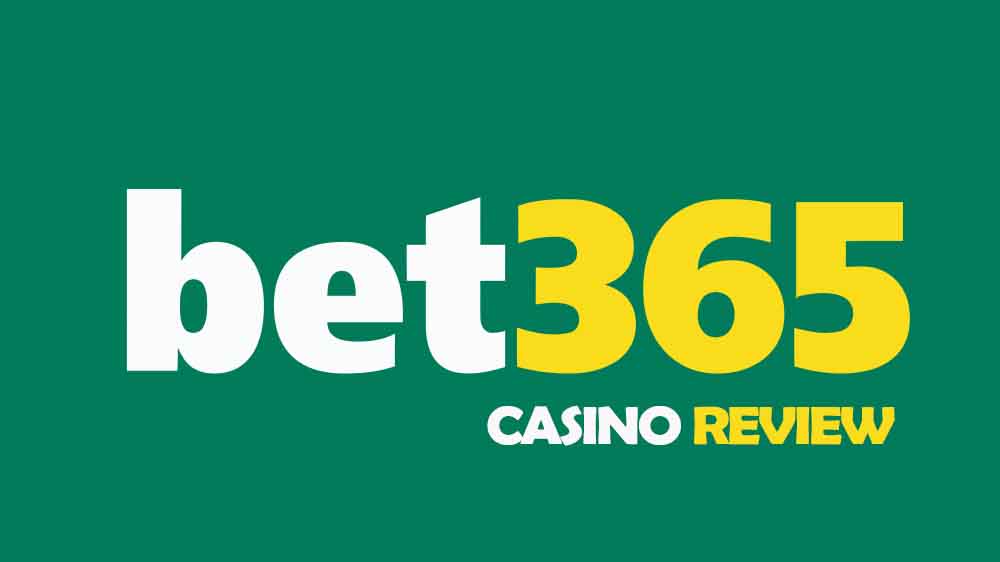
Bet365 Casino
// latest promotions.

Omni Slots Casino Claim the Double Offer: Win up to 50 Free Spins

Summer Bingo Tourney at Vegas Crest Casino: Win up to €1000

Omni Slots Casino Free Spins Offer: Get 40% Bonus + 40 FS

Play Powerball Online at theLotter: Win Up To $ 125 Million

Secret of Atlantis at Everygame Casino: Win Up to $30,000
Casino Player Magazine | Strictly Slots Magazine | Casino Gambling Tips

- Caribbean Stud
- Sports Betting
- Three Card Poker
- Online Gaming
- Video Poker
- General Gambling Tips
- Player's Club
- Money Management
- Monthly Entertainment Guide
- Entertainment News and Headliner Interviews
- Where to Play
- Casino Player
- Strictly Slots
- Subscriber Services
- Print Advertising
- Digital Advertising
- Website Advertising
- Certified Loose Slots Program
- Best of Awards
- Employment Opportunities
Rolling on the Rivers – Riverboat Casino
Editorial Staff | Posted on April 10, 2010 |
After 15 years of evolution, riverboat casin o s have become resort destinations in and of themselves
By frank legato.
Consider the term “riverboat casino.” These days, the term conjures up images completely different than when the modern riverboat gaming industry was inaugurated in Iowa some 15 years ago. Back then, riverboat casinos were little more than a means of bailing out state budgets—of clearing red ink in government ledgers without raising taxes.
The idea was to use gambling to raise money, but to restrict it to waterways¬. To distinguish them from “real” casinos, as existed only in Atlantic City and Las Vegas, they would be kept from land, thereby saving “respectable” people from the specter of gambling in their neighborhoods. To give them charm and appeal for gamblers, they would recall the times of Mark Twain, designed as replicas of legendary 19th century paddlewheel steam riverboats on which frontier characters played draw poker while floating lazily up and down the Mississippi River.

Riverboat casinos, once viewed as a necessary evil to communities in which they were legalized, grew to be vital parts of those communities, providing jobs and economic revival to depressed areas, and donating millions to local charities. For the people who played there, the vessels became hot regional destinations, providing escapes for drive-in customers and great gambling deals for the locals.
Anthony Sanfilippo, president of Harrah’s Entertainment’s Central Division, has been operating in the riverboat market since the early days. He has been with Harrah’s for nine years, and he says the past decade has seen changes not only in the way players see riverboat gaming, but in the way communities see the casinos.
“The main difference today is the acceptability of gaming in communities that were considered new jurisdictions 10 years ago,” Sanfilippo says. “Ten years ago, gaming was stereotyped—from movies, mainly—and communities didn’t have an understanding of their economic impact in the local community and state, as well as the ability to bring a whole new type of entertainment experience into their community.”

Those two vessels would eventually grow into what is now Isle of Capri Casinos, Inc., but first, Goldstein faced quick competition, both in Iowa and across the river in Illinois. The biggest threat to those first riverboats, though, was Iowa’s own gaming law, which imposed a limit of $5 per bet and a “loss limit” of $200 per person, per cruise. With boats required to cruise during the warm months, that meant if a customer lost $200 in the first half-hour of a two-hour cruise, he was stuck doing nothing for the other hour and a half.
Nearby states were quick to pick up on the fact that gamblers were looking for less restrictive rules. In September of 1991, Illinois launched its riverboat gaming market, with no bet restrictions or loss limits. The following year, Goldstein moved his two original boats to the Gulf Coast to become the first to open in Biloxi with his renamed Isle of Capri casino. Not only did Mississippi allow casinos to operate without betting restrictions; there was no cruising requirement. Vessels were permanently docked, and—for better or worse, as we now know—most were built on barges directly on the water, forming what were essentially floating land-based casinos.

The first riverboat casinos made money through what is known in the trade as “convenience gambling,” meaning people went there solely because it offered gambling close to home. The ability to gamble without traveling to Las Vegas or Atlantic City made up for the fact that typically, one would find slots and table games cramped on several levels of a paddlewheeler. Little comfort, lots of action.
However, as with most forms of entertainment, increased competition ultimately led to better offerings, larger facilities, and a wealth of choice for the player. This was aided by the fact that the Indian gaming market was launched at essentially the same time as the riverboat market. Racinos were not far behind; nor were new land-based commercial casinos in markets like Detroit. Riverboat casinos could no longer afford to be convenience gaming outlets. They now had to compete for their customers with a collection of gaming choices that was not even on the radar of the visionaries who started riverboat gaming in the early 1990s.

Many of the older multi-level paddlewheel riverboats were replaced by massive single-level vessels with as much casino space as many traditional land-based casinos. Riverboat gaming operators expanded landside entertainment and dining complexes, added hotels, and built golf courses.
Riverboat casinos were no longer cramped vessels where gamblers put up with crowded conditions and discomfort for the sake of laying down a bet. They were resorts.
Evolution of the Offering Sanfilippo of Harrah’s says he has watched the riverboat market grow from gambling joints into full-blown destination resorts. “Early on, the experience was centered around pure gambling, with some food offerings,” he says. “Over 10 years, we’ve seen an evolution of our offerings. For example, at our Horseshoe Hammond, we are under way with a complete renovation that will transform the property.”

While many improvements and expansions have been made to the landside dining and entertainment facility, the multi-leveled vessel itself had little room for improvement. The $485-million makeover of Horseshoe Hammond will replace that vessel with a huge riverboat placing all gaming on one level. On the second level of the new boat will feature a state-of-the-art entertainment venue, two celebrity chef restaurants and a 2,500-seat buffet. New shore-side facilities will include Diamond and Seven-Star Lounges for top players. The expansion will be complete in the summer of 2008.
Horseshoe Hammond’s new facility will demonstrate something that has become common over the evolution of the riverboat gaming market: Riverboats these days are destinations, in and of themselves, and they are viable alternatives to the plane trip to Las Vegas or the larger land-based casinos of Atlantic City or Connecticut.
“The (riverboat) markets have evolved to where the non-gaming aspects of the properties are much more important,” says Wade Hundley, president of Pinnacle Entertainment, the Las Vegas-based company that operates two of the most elaborate riverboat properties in the nation, Belterra in Indiana and L’Auberge Du Lac in Lake Charles, Lousiana. “These are entertainment destinations rather than several decks of gaming.”

He adds that at the same time the non-gaming amenities have been proliferating, the riverboat markets have maintained the familiarity with their customers possible only in locals markets. “The riverboat properties will give you more personal attention than many Las Vegas properties,” says Hundley. “Your personal relationship with employees is much more evident, because Las Vegas tourist properties may see customers a couple of times a year, where in regional markets, you see them much more often.”
Hundley predicts that the riverboat market will continue to evolve along the lines of offering the best in non-gaming entertainment and pampering to go with the gaming experience. “Our company believes in building world-class destination resorts,” he says. “That’s the type of property that will be successful in the future. You want to be able to get a free spa visit or a steak dinner, and play a round of golf. People can get these things in Las Vegas, so you have to offer the same kinds of amenities—and they can get them without having to go to an airport, go through security, and go through all the other hassles that come with traveling far away.”

Tourism based on gaming entertainment—it’s a concept that once was confined to markets such as Las Vegas and Atlantic City. Nowadays, the Midwest riverboat markets offer an experience that is, in the end, worth the trip.
The Gems You will, in fact, find something worth the trip in each riverboat region of the country. Here are a few of the gems to be found in each of the riverboat states:
Iowa Much of the first riverboat gaming market remains as it was when it launched the industry in the early 1990s. While they can now remain docked and can operate without the silly betting restrictions, most of the 10 Iowa riverboats are still simple and small.
The exceptions to this rule are obvious every year when we do our “Best of Gaming” survey. Iowa’s two “category-killer” riverboat casinos are in Council Bluffs—Ameristar and Harrah’s. Over in Bettendorf, Isle of Capri’s second Iowa entry is definitely worth a visit as well.
Ameristar Council Bluffs This massive paddlewheel-style riverboat features around 38,000 square feet of casino space spread over three levels, with 1,651 slots and 31 table games. A great player’s club offers frequent 4X-point days and cashback on both slots and tables. Ameristar would be a typical old-fashioned riverboat casino, except for all the stuff that goes along with the games, much of it on the shore-side complex: great restaurants, including the much-acclaimed Waterfront Grille for the best steaks in the market; a 160-room hotel including eight beautiful luxury suites, 32 unique “king whirlpool rooms” and great river views; lounge entertainment at two cabaret bars, and headliners at the Amerisports Bar. In short, all the casino comforts in a river setting.
Harrah’s Council Bluffs Similar in style to Ameristar—a three-deck paddlewheel vessel with hotels and restaurants on shore facilities—Harrah’s consistently gets our readers’ nod as the best overall riverboat casino hotel in Iowa. With just over 1,000 slots and around 35 table games spread over three levels, the gaming is comparable to Ameristar, with the added benefit of the Harrah’s Total Rewards national player’s club. Harrah’s also is known for its great 240-room hotel; restaurants such as the 360 Steakhouse and the ’50s-style Ace’s Diner; and the hip Stir nightclub.
Isle of Capri Bettendorf Isle deserves honorable mention in Iowa for the property it built in the location of the property that inaugurated the riverboat market, Bettendorf. While gaming offerings are on par with other riverboats its size (like the Council Bluffs boats, it is a three-level, paddlewheel-style vessel), the adjacent 256-room hotel is outstanding, from its elegant lobby to comfortable standard rooms to the fantastic theme suites.
Illinois Illinois has nine riverboats, with the 10th license still wrapped up in the courts with legal challenges from Emerald Casino, Inc., over the revocation of its license.
The other nine riverboat casinos are mostly smaller properties, with a few large gems. There is still a $5 admission fee, although some properties, such as Harrah’s, have waived it if you flash a player’s club card. The best feature of many—and a large reason for their popularity—is proximity to the city of Chicago. In fact, the four Illinois casinos and five Indiana casinos which are all within an hour’s drive of Chicago, and which form the casino market commonly known as “Chicagoland,” constitute the third-highest-grossing casino market in the country.
Gems on the Illinois side of Chicagoland include Harrah’s Joliet and the Grand Victoria in Elgin, but one other Illinois casino far from Chicago deserves honorable mention—the Casino Queen in East St. Louis, on the Missouri border.
Harrah’s Joliet Located around 30 miles from Chicago, Harrah’s Joliet is casino on a barge docked on the Des Plaines River. During the third quarter of 2001, the two existing riverboat casinos, which had been linked by a “transition barge” after Illinois approved dockside gaming in 1999, was replaced with the single-level, Vegas-style casino. Shore-side facilities adjacent to the casino include a pavilion featuring a lounge and a retail shop, and n 11-story luxury hotel with a fitness center. You will find some of the best video poker in Chicagoland here, as well as great headline entertainment at the Stage 151 concert venue.
Grand Victoria Docked on the Fox River in Elgin, around 31 miles from Chicago, the Grand Victoria is a classic paddlewheeler on the outside, but once inside, you’d never know it. The casino’s spacious single-level interior, housing around 30,000 square feet of gaming space, sports the classic elegance of a high-end Las Vegas-style design. Grand Victoria is one of Chicagoland’s most popular casinos, and our readers consistently vote it Best Casino in the market because of good rules on the table games, great cashback and comps, and the best dealers and hosts in the business. If you go, don’t forget to visit Buckingham’s for great steak.
Casino Queen Across the state from the Chicagoland market in East St. Louis, you will find the casino with the loosest slots in the nation. This classic paddlewheel riverboat with its 27,500-square-foot casino did something last year that no other casino in the nation has been able to do: it unseated the Las Vegas locals casinos for the crown of Loosest Slots in the Nation, returning a remarkable 95.13 percent of all wagers to players, in all denominations. Among the other pleasant surprises here are a first-rate hotel, a great sports bar, and a fantastic steakhouse called the Royal Table.
Indiana There are two distinct markets for riverboats in Indiana—the five casinos on the Indiana side of the Chicagoland market, and the southern Indiana casinos along the Ohio river, which serve the Cincinnati, Ohio, and Louisville, Kentucky markets. In all, there are 10 riverboat casinos, with an 11th on the way in French Lick, to be placed on a man-made lake between two resort towns.
In the Chicagoland area, there is one Indiana choice that stands out above all the others—Resorts East Chicago. In the South, there are three standouts—Caesars Indiana, Argosy Lawrenceburg, and the fabulous Belterra.
Resorts East Chicago Resorts East Chicago, the massive yacht-style riverboat that opened as Harrah’s East Chicago, is the clear choice as the best casino in the Chicagoland market. Harrah’s sold the 53,000-square-foot casino a year ago to Resorts International Holdings, as part of the divestitures associated with its takeover of Caesars. Thankfully, Resorts has not altered it significantly. In our annual reader survey, this property consistently ranks as the best overall hotel casino in the market, along with the best rooms and suites, in the 286-room adjacent hotel.
Caesars Indiana This is one of those riverboat properties which, if seen only from the inside, is virtually indistinguishable from an upscale Las Vegas resort casino hotel. Caesars Indiana is attached to one of the most beautiful hotels in the market, its elegant lobby awash in marble befitting the familiar Roman theme. The riverboat itself, on the 5,000-passenger side-wheel style vessel dubbed Glory of Rome, is the largest riverboat casino in the world, with some 90,000 square feet of gaming space. There is fantastic slot selection, great video poker, and top-notch table games and poker room. You can’t go wrong here.
Argosy Lawrenceburg Another behemoth on the Ohio, Penn National’s Argosy Lawrenceburg casino—the closest to Cincinnati—features some of the best slots and video poker in southern Indiana, as well as another great hotel. It is one of the most popular riverboat casinos in the nation, not only for its games—2,300 slots and 80 tables spread over three levels—but for a promotion-rich slot club that many consider the best in the market.
Belterra And then there’s Belterra. Pinnacle Entertainment’s Belterra property is not as large as its neighbors, but is one of the very best riverboat casinos in the country. The two-tower hotel is twice as large as competing locations, a recent expansion bumping the room count to 608, including 57 luxurious suites. Staying at the hotel gives you access to a package of top amenities dominated by a championship golf course. The casino is just as good: The slot floor stocks the newest games on the market. Table games include five-deck blackjack and 10-times odds on craps. In short, what’s not to like?
Missouri Missouri has 11 riverboat casinos, but there are only two names you need to know: Ameristar and Harrah’s. Ameristar operates top properties in Kansas City and St. Charles, and between those properties and the Harrah’s casinos in St. Louis and North Kansas City, the two operators dominate the market.
Ameristar Kansas City / St. Charles This is a remarkably beautiful dockside casino, its two levels bedecked in gold and elegant trappings. It is a consistent winner of most of Player’s top awards for Missouri in the annual survey—clearly a favorite of players for its hotel, its restaurants, its slots, its tables, blackjack, entertainment and restaurants. As far as Missouri goes, this is the place to be. Ameristar St. Charles, recently refurbished to the tune of $360 million, is not on par with the Kansas City property. By next year, the St. Charles property will add a new 25-story hotel tower housing 400 luxury suites.
Harrah’s St. Louis Harrah’s dominates downtown St. Louis with this huge dockside facility, featuring a total of 120,000 square feet of gaming space. Harrah’s gets high marks for its hotel rooms—including some great room packages—as well as its casino promotions, and of course, the typical Harrah’s service and the ever-present Total Rewards national player’s club.
Louisiana Louisiana has 15 riverboat casinos spread out across three regions—Baton Rouge/New Orleans, Shreveport/Bossier City, and Lake Charles. The two standouts in the state are operated by Harrah’s (which also operates a land-based casino in New Orleans) and Pinnacle Entertainment.
Horseshoe Bossier City When Harrah’s Entertainment acquired the Horseshoe brand a couple of years ago, one of the best properties that came with it was the Horseshoe riverboat in Bossier City. Built by Jack Binion as the first casino in the market, it is a beautifully elegant paddlewheeler with some of the best poker, table games and slots in the state. It is adjacent to a magnificent 606-room, all-suite hotel with some of the best resort amenities to be found anywhere in the riverboat market.
L’Auberge du Lac The newest riverboat casino in Louisiana is also the best. Pinnacle’s L’Auberge du Lac Hotel & Casino is simply gorgeous, its single-level dockside casino only one part of an amazing resort set on 227 acres. Pinnacle has here reprised the formula that worked so well at Belterra, with a 600-plus room, high-end hotel feeding the central feature of the resort—a Tom Fazio-designed, 18-hole championship golf course. As we said with Belterra, what’s not to like?
Rolling on the Rivers – Riverboat Casino.

- Skip to primary navigation
- Skip to main content
- Skip to primary sidebar
OnlineGamblingWebsites.com
Just another WordPress site
What Are Riverboat Casinos & Do They Have to be Sailing For You to Gamble?
October 5, 2022
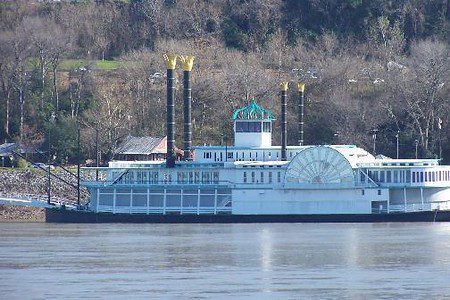
If you’ve watched films such as Maverick , starring famed anti-semite Mel Gibson, or TV shows like Ozark , you will know at least a passing amount about riverboat casinos. They often look like something out of a Mark Twain novel, powered by steam and paddles and are suggestive of a bygone era when you see them floating on the water. In the modern era, of course, they are filled with bright and flashy slot machines that make a lot of noise and ensure that you won’t be expecting Twain to walk around the corner.
The idea behind riverboat casinos was that it would limit the areas in which casinos could be constructed, enabling gambling but keeping it to specifically designated areas. The fact that the boats were seldom taken away from the dock, or even ever taken away in some cases, didn’t change the point that the legal fiction was able to be sold by various authorities. In essence, there is no difference between a riverboat casino and a permanent one on land, with the exception being that boat casinos can get licences to operate where land ones can’t.
The History of the Riverboat Casino
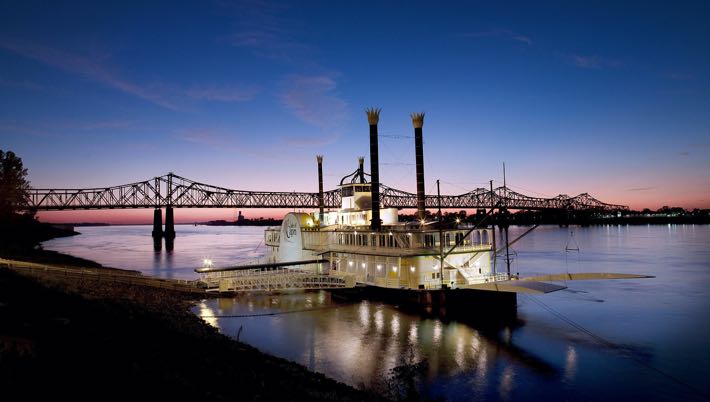
You can’t understand the history of riverboat casinos without first having a sense of the history of riverboats in general. Paddlewheel riverboats were introduced to the Mississippi River and some of its tributaries as a way of transporting passengers and goods during the 19th century. By the 20th century, however, rail had largely taken over as the quickest and cheapest way to get things around the country, meaning that the paddlewheel riverboats needed to be re-invented as something else entirely. This was when they began to be used as floating casinos.
Entertainment for Long Voyages
Of course, gambling and sailing has a long history. Voyages by sea are long and tedious, with ships in the past lacking the entertainment options that you would expect to find nowadays. So it is that sailors and passengers would often engage in games of chance whilst taking part in a long voyage. As life in the United States of America reached a degree of normality in the wake of the American Civil War, riverboats began to be used as a way of enticing gamblers to places where they would otherwise have nowhere to go.
Legal Loopholes
States had widely prohibited gambling in the US by the start of the 20th century, which is why those looking to gamble sought legal loopholes. States began to approve the use of riverboats, especially in ones that had frontage along the Mississippi. It was for this reason that the likes of Illinois, Louisiana, Indiana, Missouri and Mississippi itself began to allow a limited number of riverboat casinos to be opened, attracting gamblers that wouldn’t be allowed to place a legal bet on land in those same states, save for on Native American Reserves.
City of Traverse
The first riverboat casino, the City of Traverse , set sail on Lake Michigan in 1904. The Big Muddy, as the Mississippi River was known, bordered several different states, which made it something of a legal grey area. It was for this reason that Senator Lyndon Johnson helped to draft the Transportation of Gambling Devices Act in 1951. That made it a crime to transport gambling decides over state lines, unless it was legal at the destination. It didn’t stop all riverboat casinos, but it made it trickier for some of them.
What Riverboat Casinos Offer
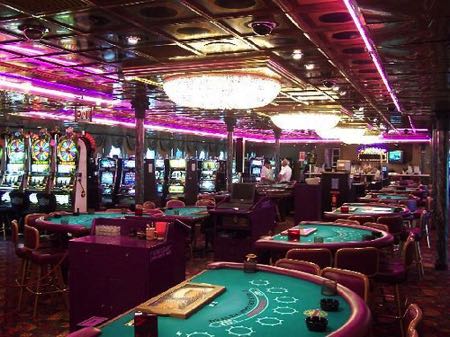
As with casinos on land, riverboat casinos offer different things to customers based on numerous different factors. If a riverboat casino has discovered that very few people in the area enjoy playing poker, for example, then they are going to be unlikely to actively offer a poker room. Similarly, if it is discovered that people heading to one riverboat casino aren’t playing slots, then slot machines will be limited in number. As with land-based casinos, it is the customer that dictates what is and isn’t offered by a riverboat casino, wherever it is located.
That being said, there are some things that you can expect to enjoy at most riverboat casinos. Table games are always popular at such venues, meaning that the likes of roulette, craps and blackjack are commonplace. Equally, slots are usually good money makers for any casino, so a floor that is dedicated to such electronic forms of gambling isn’t unusual. Whilst card rooms for poker games and so on aren’t always found, they also aren’t unusual. In short, if you want to do something specific, it’s worth finding out if the riverboat casino you’re heading to offers it before you get there.
Do They Have to Be Sailing for You to Gamble?
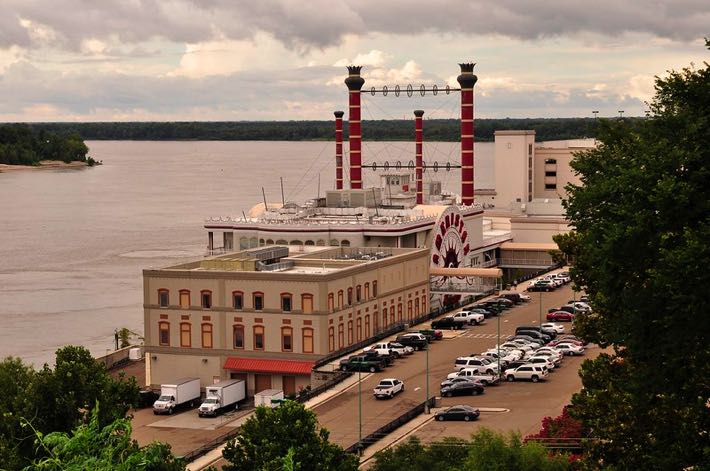
Now that we know a little bit more about riverboat casino and their origin, it is worth asking the question about whether or not they need to be gambling in order for you to be able to place a bet. The short answer is: it depends. Each state has its own rules and regulations around how riverboat casinos have to work, which includes whether or not they need to be sailing for betting to be legal. In the majority of cases, the rule of law states that the casino has to be ‘solely over and in contact with the surface’ of the river it is on.
What this means, in essence, is that the main bulk of the riverboat casino has to be in the water. It can be connected to land by something like a bridge, but it would need to be able to sail away if required to do so by the licensee. To put it another way, in most states, it couldn’t be a building built on the docks or on the side of the river in order to be a legally licensed casino. Instead, it needs to be in a situation where the majority of the vessel is in the water and only a method of getting on board is allowed to be on the nearby land.
The Curious Case of the Potomac River
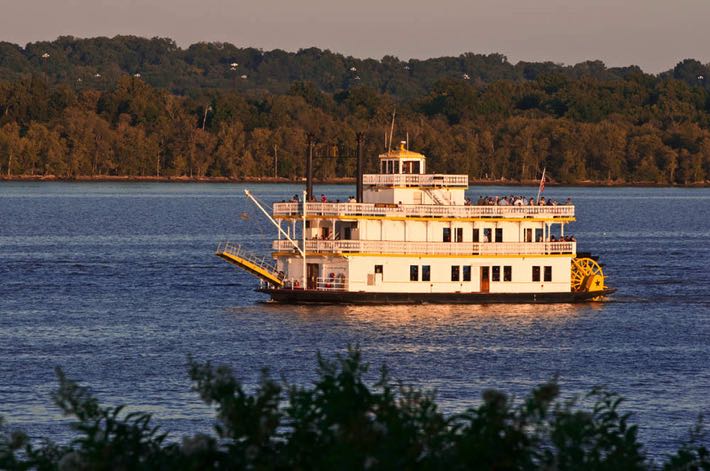
The interesting thing about riverboat casinos is that they regularly end up being in fascinating situations. This is perhaps best demonstrated by the tale of the Potomac River, which is on the state border of Maryland and Virginia. In the middle of the 20th century, there were several riverboat casinos docked off the coast of Virginia, even though gambling wasn’t legal there. The border between the two states isn’t the middle of the river, but rather at the low water mark on the Virginia side of it, confusing things.
The result of the state border being where it is is that, with the exception of a small part of the river that is in the District of Columbia, the majority of the river is technically in Maryland. For this reason, punters could drive to Virginia and park there before walking onto a riverboat casino, at which point they had crosses state lines and were in Maryland. They were then able to gamble entirely legally, all whilst within virtual touching distance of a state where it would have been illegal to have been doing exactly the same thing.
The Riverboat Casinos That Pushed Their Luck
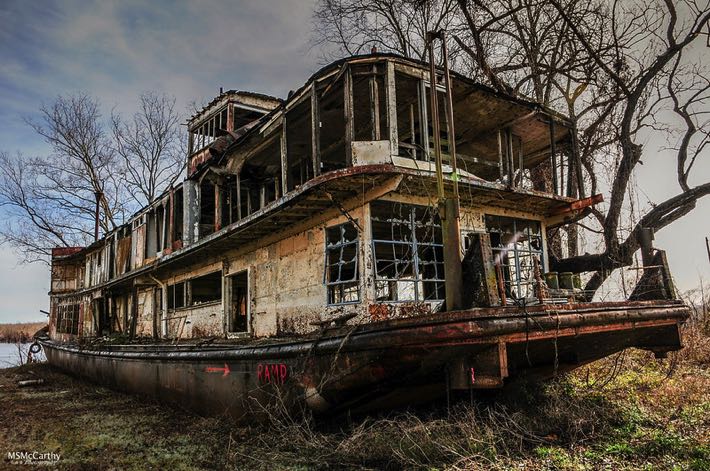
In 1994, it was decided by voters in Missouri to allow ‘games of chance’ to take place on the Mississippi River and the Missouri River. Four years later and the state Gaming Commission believed that just three of the 16 such casinos operating in the river were ‘clearly on the main river channel’. As several casinos had actually been located on riverboats that were in an area with water that was adjacent to the river, such as a lock, it was felt by those that were against gambling in the state that they should be shutdown.
By that point, however, the state had realised just how much was being brought in thanks to tax on the $652 million industry. The state was entirely unwilling to give up the revenues being generated by the riverboat casinos, so over a period of time the rules were relaxed. It got to the point that casinos were allowed to be built on stilts, with the only proviso being that they had to be over water that was navigable. This meant an end to the practice of ‘ Boats in Moats ’ that the area had become quietly quite famous for.
When Hurricane Katrina hit the US in 2005, many of the riverboat casinos were destroyed entirely. The casinos themselves, as well as the hotels and restaurants that adjoined them, were left devastated. What resulted was a decision from many states to change their regulation on the matter, allowing casinos to be built on land as long as they were within certain geographical limits close to a navigable waterway. Since the hurricanes the majority of Mississippi’s riverboat casinos have been rebuilt with far more solid foundations.
Riverboat Casinos & Native Americans
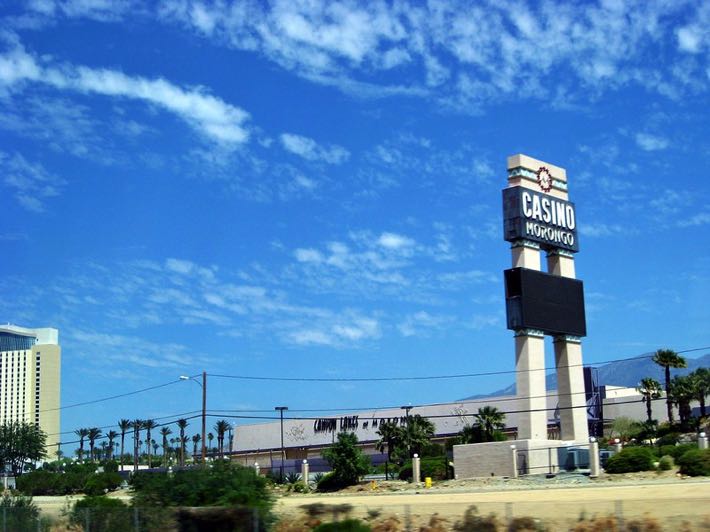
It might seem strange, but those that love riverboat casinos actually owe a debt of thanks to Native Americans. Towards the end of the 1980s, the case of California v. Cabazon Band of Mission Indians ended up in front of the Supreme Court. The state of California believed that the games of poker and bingo that were taking place on the land of the Cabazon Band of Native Americans violated state law. The Native Americans, unsurprisingly, disagreed, believing that tribal land fell under civil regulatory laws, not the lawful jurisdiction of the state.
The Supreme Court found that California’s state lottery meant that gambling was not prohibited as a criminal act, meaning that the authority to regulate any gambling actives on tribal lands fell outside the powers that were granted by the Public Law 280 ruling. This had lasting impact for Native Americans around the sovereignty of their land, including the fact that states could not impose regulations on reservation gaming. Instead, gambling in Native American land could only be questioned if it was in a state where gambling was considered criminal according to the state laws.
This led to an explosion of legalised gambling in states throughout America. The result of this was that states wanted to get in on the act, hoping to open casinos that would allow them to make money whilst limiting the influence of organised crime. The result of this was that riverboat casinos sprang up in places where the geography allowed it, ensuring that most of the new venues owed a lot to the Native Americans that had pursued the right that they believed they had to gamble legally on their own land.
Curious Things About Riverboat Casinos
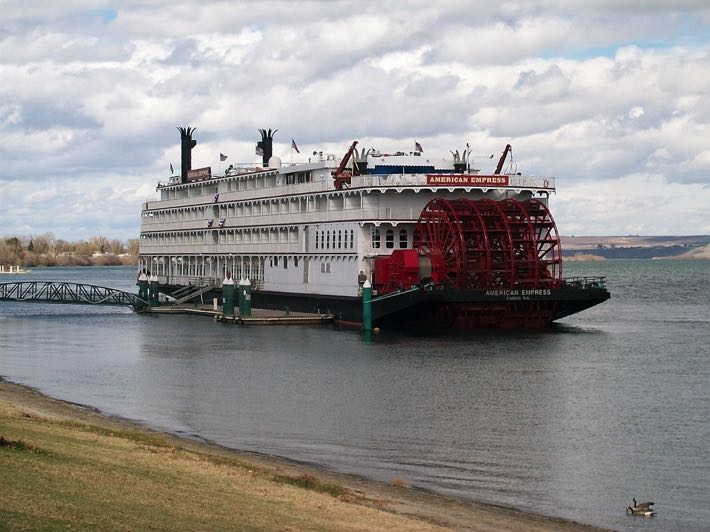
There are numerous different facts about riverboat casinos that are interesting and worth knowing. For example, many historians believe that vigilantes would take the law into their own hands when cheats were found to be operating on riverboat casinos. In 1835, a group of five such cheats were lynched in Vicksburg in the state of Mississippi after having been discovered. Also, when riverboat gambling was first legalised in Louisiana, any vessels operating out of the state had to look like a 19th century paddleboat.
By 2018, there were 63 riverboat casinos operating across the six states where it was legal for them to do so. That year, Illinois took $382.5 million in state tax, whilst it was $152.1 million in Missouri. In terms of examples of riverboat casinos, there is perhaps none as impressive as the American Empress, which is diesel-powered and stands at 360 feet in length. As well as the casino on board, there are also artefacts from the Gold Rush, Russia and Native Alaska, making it a floating museum, as well as a casino.
Riverboat casinos – why does the casino have to be on a boat?

A riverboat casino is exactly what it sounds like: a casino on a riverboat. These exist in several US states, through which the Mississippi River flows. There are also some along the Gulf Coast. A few states allowed this type of casino to limit the areas where casinos could be built without outlawing gambling . The riverboats were rarely moved away from the port, if ever.
History of riverboat casinos
Riverboats with paddlewheels had long been used on the Mississippi and its tributaries to transport cargo and people. After they were largely displaced by railroads, they became more popular for short trips, up to a few hours long, than as transport from one riverfront town to another. They were also a way to enjoy live music and dancing and find a cool place to relax, away from the scorching urban heat.
On riverboats, gambling was far from uncommon
There were card games, slot machines , and more. When states approved riverboat casinos in the late 20 th century, and land-based gaming was generally prohibited, these casinos had to be located on ships. In some areas, gambling was legal only when the boat was not docked, as in the traditional trips. Riverboat casinos were allowed in states like Illinois, Indiana, Louisiana, Mississippi, and Missouri. In Illinois, they were also allowed in the Chicago metropolitan area, which is connected to the Mississippi River via the Chicago Sanitary and Ship Canal. There are three ‘riverboat’ casinos in harbors along Lake Michigan in Indiana.
A curious event
A situation on the border between Virginia and Maryland led to an unusual event on the Potomac River around 1950. The border is at the low water mark on the Virginia side, not in the middle of the river. In fact, the whole river is practically in Maryland with the exception of a few small areas in the District of Columbia. Due to this, there were several riverboat casinos docked off of the Virginia shoreline in the middle of the 20 th century. At this time, gambling was not legal in Virginia, but it was legal in parts of Maryland. Considering that the river was in Maryland, people could park in Virginia and walk across a pier, thereby crossing the border between the states.
Developments in the 90s
In 1994, Missouri changed its state constitution to authorize “games of chance” on the two rivers running through the state: the Mississippi and the Missouri. Four years later, just three of the 16 operations comprising Missouri’s riverboat gambling industry, already worth more than $600 million, were clearly on the main river channel according to the state’s gambling watchdog, the Gaming Commission. The supreme court of the state had ruled that riverboats had to be “solely over and in contact with the surface” of the rivers.
A number of operators had been located on riverboats in an area with water by a navigable waterway or a moat, due to which they were referred to as “boats in moats.” The state legislatures were not inclined to waive the high revenues gambling generated. With time, they let casinos be constructed on stilts, but they had to be located over navigable water.
Hurricane Katrina and its aftermath
After Hurricane Katrina destroyed most riverboat casinos in 2005 along with their associated facilities of restaurants, hotels, and more in southern states, a number of them amended their constitutions or changed their legislation. They allowed casinos to be constructed on land near a navigable waterway. Most of the riverboat casinos on Mississippi’s Gulf Coast have been rebuilt on beachfronts with stable foundations after the hurricane.
The future of riverboat casinos
Riverboat casinos will always be a popular form of entertainment along the Mississippi. People can enjoy playing in these historic paddleboat gaming hubs in Illinois, Iowa, Louisiana, and Mississippi as this mighty river flows across many different state lines. It is the second-longest river in North America, flowing out from its estuary in Lake Itasca, Minnesota through the heart of the country and flowing into the Gulf of Mexico. Its total length is 2,350 miles.
The mighty river was the center of economic activity in the 19th century south. This geographical region was famous for the paddle steamers that used to cruise up and down the Mississippi long before online casinos existed.

Leave a Reply Cancel reply
Your email address will not be published. Required fields are marked *
Save my name, email, and website in this browser for the next time I comment.

This Week In Illinois History: Riverboat Gambling Comes To Illinois (Feb. 7, 1991)

Illinoisans have bet on horseracing since 1927, purchased Lottery tickets since 1974 and gambled for non-profit charities since 1986.
But on Feb. 7, 1990, Gov. James Thompson signed the Riverboat Gambling Act , laying odds on economic development and tourism.
With a blackjack table as a desk, the signing ceremony took place at the Peoria Boatworks. A steamboat blasted its whistle while a calliope played “ Happy Days are Here Again .”
The newly created Illinois Gaming Board granted 10 licenses, giving preferential treatment to economically depressed areas outside the Chicago area. Riverboat casinos could operate only on water and gambling was permitted only after the boats left the dock.
The first license went to Alton, which launched Illinois’ first riverboat casino, the Alton Belle, on Sept. 10, 1991. The three-deck, 600-passenger boat held 296 slot machines and 22 gambling tables.
In the first year, riverboat gambling brought in $8 million in tax revenue. The next year, it raked in $54 million, surpassing horseracing revenue.
On May 21, 1999, Gov. George Ryan signed a new Riverboat Gambling Act, which allowed gambling to continue on riverboats while they remained dockside. The new law, however, allowed an easy work-around. Rivers Casino in Des Plaines, for example, dug a shallow pit on dry land, filled it with water, and built a casino over it.
Riverboat gambling tax revenue peaked at $699 million in 2005.
In June 2019, Gov. J.B. Pritzker signed legislation allowing Illinois’ 10 riverboat casinos to move operations to dry land, effectively tapping out this brief and quirky footnote to our state history.

Laissez le Bon Temps Roulette: Letting the Good Times Roll on Riverboat Casinos
Until 1990, casino gambling was legal only in Nevada and Atlantic City, N.J. Since then, it has been authorized in 23 states, including four in the Eighth Federal Reserve District. In a quest to raise revenues without imposing additional taxes on the populace, these states have approved casino gambling, touting that new jobs will be created and additional monies will be made available for education.
Iowa, which was the first Midwestern state to approve riverboat gambling, found it to be quite successful. Illinois, Missouri, Indiana and Mississippi have now followed Iowa's lead and passed riverboat gambling initiatives. The degree of success of these operations varies by state and depends on the concentration of nearby competition. Because gambling is too new in Indiana and Missouri, riverboats in Illinois and Mississippi are the centerpieces for our District. Arkansas, Kentucky and Tennessee have not yet tackled the issue, either in an election or in the legislature.
Illinois' first boat opened in September 1991. During its first week of operation, which was only five days long, 7,130 people attended, and adjusted gross receipts—after payouts for winnings—were about $296,000. Of this total, about $73,500 was paid in state and local taxes: Illinois requires two dollars of the admission fee go to the state and locality (one dollar to each) and imposes a wagering tax—15 percent to the state, 5 percent to the locality—on the adjusted gross receipts.
At the end of 1991, with two riverboats operating, adjusted gross revenues in Illinois were almost $15 million, with more than $3.5 million in taxes going to government agencies. By 1993, Illinois had 10 riverboats, with revenues of almost $606 million. During the first quarter of 1994, 12 riverboats produced revenues of slightly more than $217 million, about $10 million less than receipts for all of 1992, and logged more than four million visitors. If attendance and revenues continue on this path for the remainder of the year, the state can expect to collect wagering taxes of almost $175 million and admissions taxes of about $34 million.
Illinois law does not allow dockside gambling, unless circumstances prevent the boats from cruising, nor does it include a loss-limit—the maximum amount an individual can lose during a gambling excursion. This certainly gives its casinos an advantage over those that are subject to a loss-limit in neighboring states, like Missouri.
Voters approved Missouri's riverboat gambling referendum in November 1992, and plans were immediately hatched to place riverboats in the St. Louis and Kansas City metropolitan areas. Opponents of gambling, however, filed suit, questioning whether games of chance—slot machines, craps, roulette, etc.—were constitutional in the state. The state Supreme Court said no, thereby requiring a constitutional amendment to allow such games on the boats. In April 1994, the amendment failed by the narrowest margin in state history. A recount was requested by the pro-gambling campaign, but the outcome was a wider margin of defeat for the amendment. In response, the state legislature legally redefined games of skill to include craps, video poker and video blackjack. This law is expected to face a court challenge, but, until then, riverboats have opened to offer games of skill.
Missouri imposes admission and wagering taxes similar to Illinois'. The state receives 18 percent and the locality receives 2 percent of adjusted gross revenues; two dollars of the admission fee are turned over to the state gaming commission, which keeps one and gives one to the locality. Also like Illinois, Missouri does not allow dockside gambling. 1 It does, however, impose a loss-limit of $500 per excursion on individuals. This provision superficially appears to handicap Missouri casinos against their counterparts in neighboring states where loss-limits do not exist. The provision's effectiveness is blunted, though, because it applies only to a single excursion: Individuals need only pay an additional admission fee for further excursions to continue playing. What this will mean for revenues remains to be seen, particularly because many of the plans, especially in St. Louis, call for extensive land-based building—for example, hotels—in conjunction with the riverboats, which will raise other revenues for the state.
Casino Gambling in the United States

NOTES: Nevada has about 2,200 gambling establishments in all counties. The three major sites are "pinned" on the map. Alaska and Hawaii currently do not have casino gambling. Tribal reservation information is current through May 2, 1994. Land-based and riverboat casino information is current through June 24, 1994.
SOURCES: Land-based and riverboat casinos: State departments of gaming or state gaming commissions. Tribal reservation casinos: National Indian Gaming Commission.
Indiana enacted its gambling law in July 1993, allowing individual counties and municipalities to ask voters if they want riverboats in their area. Currently, the Indiana Gaming Commission has only five licenses to grant to Ohio River communities; six counties, across the river from Cincinnati and Louisville, have already passed referendums. The first boat is expected to open by the end of this year. As in the other states, Indiana will impose admission and wagering taxes on the casinos. The state retains 15 percent of adjusted gross revenues, and the local and county governments each get 2 ½ percent. Of the $2.50 admission tax, one dollar each goes to each the local and county governments, and 50 cents goes to the state. Unlike Missouri, Indiana does not have a loss-limit provision. As in Illinois and Missouri, dockside gambling is allowed at the boat captain's discretion for safety. This allowance for dockside gambling, though, is still more restrictive than that in other states, for example, Mississippi.
Mississippi
Mississippi's first boat opened in August 1992 in Biloxi. By the end of 1992, five boats had opened, four on the Gulf Coast and one on the Mississippi River in Tunica County. In 1993, another 12 boats opened for business, four of them in Tunica. This year, nine more boats opened by June, three in Tunica. Mississippi is now second to Las Vegas in total square footage of gaming space. By July 1995, the state predicts there will be more than 40 riverboats operating in the state. Tunica County alone has at least five more casinos slated to open this year and has transformed itself from one of the poorest counties in the nation to one of the fastest growing.
Unlike other states, Mississippi allows dockside gambling. Thus, operating costs for the riverboats are dramatically reduced because they do not incur the costs of cruising on the river. Many boats, in fact, do not even have engines or wheelhouses. In addition, Mississippi does not impose a loss-limit on individuals. This has led to Mississippi raising more gambling revenues than any other state except Nevada and New Jersey. For example, in 1993, with 17 boats operating by the end of the year, Mississippi boats' adjusted gross revenues were about $790 million. In Illinois, 10 boats in 1993 had adjusted gross revenues of about $606 million.
Mississippi also has a more complex taxing scheme—it imposes a progressive rather than a flat wagering tax. Essentially, the state collects an increasing percentage of monthly adjusted gross revenues: 4 percent on the first $50,000, 6 percent on the next $84,000, and 8 percent on anything above $134,000. Local taxes follow the same scheme with much lower rates, and individual counties and cities make different provisions.
Much of this fanfare may cool because of the riverboat casinos in Louisiana, especially those in the New Orleans area. On top of this, a land-based casino, which is a greater revenue generator than a riverboat, will soon open in New Orleans. Direct competition with these facilities, however, will affect the Gulf Coast boats before it reaches those up north. New Orleans' greater ability to attract visitors because of convention and sporting facilities, as well as the city's well-known appeal as a tourist destination, will hurt Mississippi, but the extent of the effect remains to be seen. Until then, Mississippi has a head start and the experience its competition does not.
Thomas A. Pollmann provided research assistance.
- There is one exception in St. Louis for a boat that does not move under its own power. [ back to text ]
Related Topics
Views expressed in Regional Economist are not necessarily those of the St. Louis Fed or Federal Reserve System.
For the latest insights from our economists and other St. Louis Fed experts, visit On the Economy and subscribe .
Media questions
The Meaning Behind The Song: Riverboat Gambler by Carly Simon

Carly Simon, a legendary singer-songwriter, has gifted the world with countless musical gems throughout her career. One such song that captures the attention of audiences is “Riverboat Gambler.” Released in 1974 as part of her iconic album “Hotcakes,” this melodious masterpiece resonated deeply with listeners, both then and now. Delving into the captivating story behind the song, we discover the profound meaning that Carly Simon intended to convey through her poignant lyrics.
Table of Contents
The Story Unveiled
Carly Simon paints a vivid picture with her words, transporting us to the intriguing world of a riverboat gambler. The song delves into the life of a fearless gambler, navigating through highs and lows, risks and rewards, all while channeling an aura of mystery. As the lyrics unfold, we enter the inner workings of the gambler’s mind, capturing the essence of his alluring yet tumultuous existence.
The gambler becomes a metaphor, representing the unpredictable nature of life itself. Through the song, Carly Simon explores the universal theme of taking chances and embracing the uncertainty that accompanies our choices. She skillfully intertwines the world of gambling with the complexities of human relationships, offering listeners a window into the complexities of love and chance.
The Symbolism Exposed
Within “Riverboat Gambler,” Carly Simon artfully weaves layers of symbolism, enriching the song with deeper meaning. The riverboat symbolizes the journey of life, floating down the river of fate, stopping at various ports of opportunity and challenges. It encapsulates the uncertain nature of existence, reminding us that we are all passengers on a vast river, navigating the currents and making choices along the way.
The act of gambling represents the risks we take in our personal lives, the decisions we make with uncertain outcomes. Just as the gambler places bets, we too must wager on our relationships, careers, and dreams. Sometimes we win, and sometimes we lose, but it is through these risks that we grow and learn, never knowing what lies around the bend.
Frequently Asked Questions
1. what inspired carly simon to write “riverboat gambler”.
Carly Simon drew inspiration from her own life experiences and observations of the human condition. She wanted to create a song that captured the essence of living life to the fullest, embracing risks and the unknown.
2. Is “Riverboat Gambler” based on a true story?
While Carly Simon has not explicitly stated that the song is based on a specific event or person, it is likely a product of her imagination. However, the themes and emotions expressed in the song are undoubtedly relatable to many.
3. What message does Carly Simon hope to convey through “Riverboat Gambler”?
Carly Simon aims to inspire listeners to embrace the uncertainties of life and take risks. She encourages us to live boldly, recognizing that each choice carries both potential rewards and consequences.
4. How does “Riverboat Gambler” fit into Carly Simon’s discography?
“Riverboat Gambler” holds a special place within Carly Simon’s catalog of music. While it may not be as widely recognized as some of her other hits, it showcases her artistic versatility and prowess as a songwriter.
5. What makes “Riverboat Gambler” stand out among Carly Simon’s other songs?
“Riverboat Gambler” stands out due to its intricate storytelling and poetic lyrics. Carly Simon effectively combines themes of gambling, love, and life’s uncertainties in a way that captivates and engages listeners.
6. Has “Riverboat Gambler” received any accolades?
While “Riverboat Gambler” did not achieve chart-topping success upon its release, it remains a beloved song among Carly Simon’s dedicated fanbase. Its impact is witnessed through the lasting appreciation and admiration it receives.
7. Can you explain the significance of the riverboat as a symbol in the song?
The riverboat metaphor in “Riverboat Gambler” represents the journey of life. It symbolizes the unpredictability we face and the opportunities we encounter as we navigate through life’s currents and make choices.
8. How does the song’s message resonate with listeners today?
“Riverboat Gambler” continues to resonate with audiences because the themes it explores are timeless. The song’s encouragement to embrace risks, seize opportunities, and accept the uncertainty of life remains relevant in any era.
9. How has the song impacted Carly Simon’s career?
While “Riverboat Gambler” may not be one of Carly Simon’s most commercially successful songs, it showcases her talent as a wordsmith and further solidifies her status as a versatile and captivating songwriter.
10. Can you find any particular lyrical highlights in “Riverboat Gambler”?
One lyrical highlight in “Riverboat Gambler” is the line, “She smiled as if to say, fate has looked my way.” This phrase encapsulates the gambler’s mindset, acknowledging the role of luck and destiny in our lives.
11. Does “Riverboat Gambler” have a deeper meaning beyond gambling?
Yes, “Riverboat Gambler” delves into the complexities of human relationships and the choices we make in matters of the heart. It serves as a metaphorical examination of life’s uncertainties beyond the confines of the gambling world.
12. What emotions does “Riverboat Gambler” evoke in listeners?
“Riverboat Gambler” evokes a range of emotions in listeners, including curiosity, nostalgia, and a sense of reflection. The song’s introspective nature encourages personal contemplation and introspection, connecting with listeners on an emotional level.
And so, “Riverboat Gambler” by Carly Simon remains an enigmatic and captivating composition, using the world of gambling as a powerful metaphor to explore the unpredictable nature of existence. Through her poetic lyrics, Carly Simon invites us to embrace the uncertainties, take chances, and navigate the river of life with fervor and belief in the enigmatic journey that lies ahead.
Explore More Song Meanings

About The Author
Alisha Rocha
Leave a comment cancel reply.
Your email address will not be published. Required fields are marked *
Riverboat gamble
Posted by ESC on January 15, 2007
In Reply to: Riverboat gamble posted by ESC on January 15, 2007
: : Does anyone know the origin of the phrase 'riverboat gamble'? It was mentioned on Channel 4 news last week and I can't seem to trace it back any further than a political discussion on Reaganomics.
: : Cheers, : : Gareth.
: "It's more than a risk, it's a riverboat gamble," said Leon E. Panetta, a Democratic member of the Iraq Study Group and former chief of staff to President Bill Clinton. : www.ndnblog.org
: "Tom Daschle has made a riverboat gamble, and he stands to lose his political shirt." www.nationalreview.com/ kudlow/kudlow010902.shtml Accessed January 15, 2007.
: I can't find it in my reference books. But I am guessing that it means the odds are stacked against you. And that in the past riverboat gambling was fixed so the house won most of the time.
Or maybe a gamble on a riverboat was risky because: "Rich and poor ships also carried the notorious 'Mississippi river gamblers' or 'river gamblers' (both terms common by the late 1840s), ranging from the professional poker players who fleeced plantation owners of their year's profits to sleight-of-hand artists and con men who preyed on the poorer innocents." From I Hear America Talking: An Illustrated History of American Words and Phrases by Stuart Berg Flexner (Von Nostrand Reinhold Co., New York, 1976). Page 347.
Words and phrases
Personal account.
- Access or purchase personal subscriptions
- Get our newsletter
- Save searches
- Set display preferences
Institutional access
Sign in with library card
Sign in with username / password
Recommend to your librarian
Institutional account management
Sign in as administrator on Oxford Academic
riverboat gambler noun
- Hide all quotations
What does the noun riverboat gambler mean?
There is one meaning in OED's entry for the noun riverboat gambler . See ‘Meaning & use’ for definition, usage, and quotation evidence.
This word is used in U.S. English.
How common is the noun riverboat gambler ?
| 1940 | 0.0053 |
| 1950 | 0.0081 |
| 1960 | 0.01 |
| 1970 | 0.011 |
| 1980 | 0.013 |
| 1990 | 0.016 |
| 2000 | 0.017 |
| 2010 | 0.019 |
Where does the noun riverboat gambler come from?
Earliest known use
The earliest known use of the noun riverboat gambler is in the 1920s.
OED's earliest evidence for riverboat gambler is from 1920, in San Francisco Chronicle .
riverboat gambler is formed within English, by compounding.
Etymons: riverboat n. , gambler n.
Nearby entries
- river bass, n. 1820–
- riverbed, n. 1781–
- river birch, n. 1846–
- river black-oak, n. 1886–98
- river-blanched, adj. 1788
- river blindness, n. 1952–
- river boar, n. 1601
- river board, n. 1823–
- riverboat, n. 1565–
- riverboat casino, n. 1958–
- riverboat gambler, n. 1920–
- riverboat gambling, n. 1953–
- river bottom, n. 1662–
- river-boy, n. 1791–
- River Brethren, n. 1849–
- river bull, n. 1639–1709
- river bullhead, n. 1763–
- river bus, n. 1929–
- river capture, n. 1890–
- river carp, n. 1653–
- river cat, n. 1770–
Thank you for visiting Oxford English Dictionary
To continue reading, please sign in below or purchase a subscription. After purchasing, please sign in below to access the content.
Meaning & use
Entry history for riverboat gambler, n..
Originally published as part of the entry for riverboat, n.
riverboat gambler, n. was first published in 2009.
oed.com is a living text, updated every three months. Modifications may include:
- further revisions to definitions, pronunciation, etymology, headwords, variant spellings, quotations, and dates;
- new senses, phrases, and quotations.
Please submit your feedback for riverboat gambler, n.
Please include your email address if you are happy to be contacted about your feedback. OUP will not use this email address for any other purpose.
Citation details
Factsheet for riverboat gambler, n., browse entry.
What Does Action Mean in Betting? – A Guide to Action and No Action in Sports Betting
If you have found yourself wondering “what does action mean in betting?”, then you have come to the right place. We’ll take you through everything you need to know about action betting.
Sam is a casino fanatic with nearly a decade of experience working in the iGaming industry. Sam started as a sports betting analyst who now covers the ins and outs of online casinos, sportsbooks and more for esteemed publications like Sports Casting.

David has over 25 years of experience as both a writer and editor within the betting/newspaper industries, working with major publications such as The Guardian, Racing Post and Sky Sports Racing. With a diploma in sub-editing and law, and the author of four books, David now shares his knowledge with SportsCasting as a successful sports editor, writer and tipster.
In fact, action betting and no action betting are common terms in sports, and as such, you need to understand them if you are going to jump into the “action” yourself. So, without further ado, let’s get into what action betting is all about.
What Is ‘Action’ in Sports Betting?
What is ‘no action’ in sports betting, examples of ‘action’ and ‘no action’ bets, action bets vs. listed bets, sports vulnerable to no action outcomes, best sports for betting action, tips and strategies for placing action bets, terms and conditions for action betting, what does ‘action’ mean in sports betting, is money refunded if my bet is declared no action, what does action mean in baseball, what does action reverse mean in betting, what is sharp action in betting.
You have heard your friends or people around you refer to “ getting in on the action ” or “ I’ll take that action .” This stems from sports crypto betting . Here, action simply means that you have a vested interest in the outcome of a match because you have placed a moneyline bet on either one team to win on the betting line or on a specific market.
You will officially be a part of the action when you have chosen a market, entered your wager amount, and completed your bet. So, when you have your wager slip confirmed, you are truly getting in on the action. And, with revenue in the online sports betting market set to reach $45.43bn in 2024 , there is sure to be plenty of betting action online.
You may ask yourself, what does no action mean in sports betting? When there is no action, this is usually down to a few reasons, but the most likely is that your bet was voided. This could have been due to a multitude of reasons, such as the weather affecting the match.
Your bet may also be voided if you placed a bet on a key player, but that player got injured before the game, as such, the market would no longer be available, and you would be unluckily getting no action on that event.
It’s not often that this happens, but it can happen, and it’s important that you know that, whether you are betting pre-match or live betting .
Still wondering, what does action mean in betting? Let’s take an example of action in baseball. Let’s say you have placed a parlay bet on the NFL. When your bet has been confirmed by the betting site , you are then in on the action.
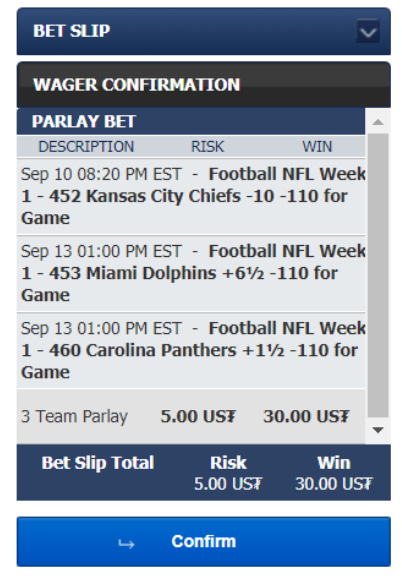
Whether the parlay wins or not, you are still in on the action. Of course, you would prefer to win, but action betting doesn’t mean winning; it is simply that you are vested in the outcome.
On the flip side, you may still be asking yourself, “What does no action mean in betting?” Well, a no-action bet might happen if you bet on a tennis game, and one of the players couldn’t play due to injury. In this instance, the match would be over, and you would be out of the action. However, your stake would be returned to you.
In certain sports like baseball, there is a difference between action bets and listed bets. An action bet remains open regardless of changes, such as the pitcher being changed at the last minute due to injury.
A listed bet is only valid if the specific player (e.g., the listed pitcher or listed pitchers) starts the baseball game. If that player does not start the match, then your bet is voided, and your initial bet is refunded to you. So, you see, there is a difference here: in one case, you can have your cash refunded, and in the other, it is simply bad luck.
There are certain sports that are more prone to no action outcomes than others. If you have asked, “What does action mean in MLB betting ?” you might be concerned if the MLB is one of the sports prone to no action. Well, it is. As we just touched on, it’s all about the listed and action bets.
If you decide to place a listed bet, it means that if the pitcher changes before the start of the match, your bet will be voided. That would mean that you have no action in the event. Of course, if you opt for an action bet, it means that no matter what happens, you are locked into the bet.
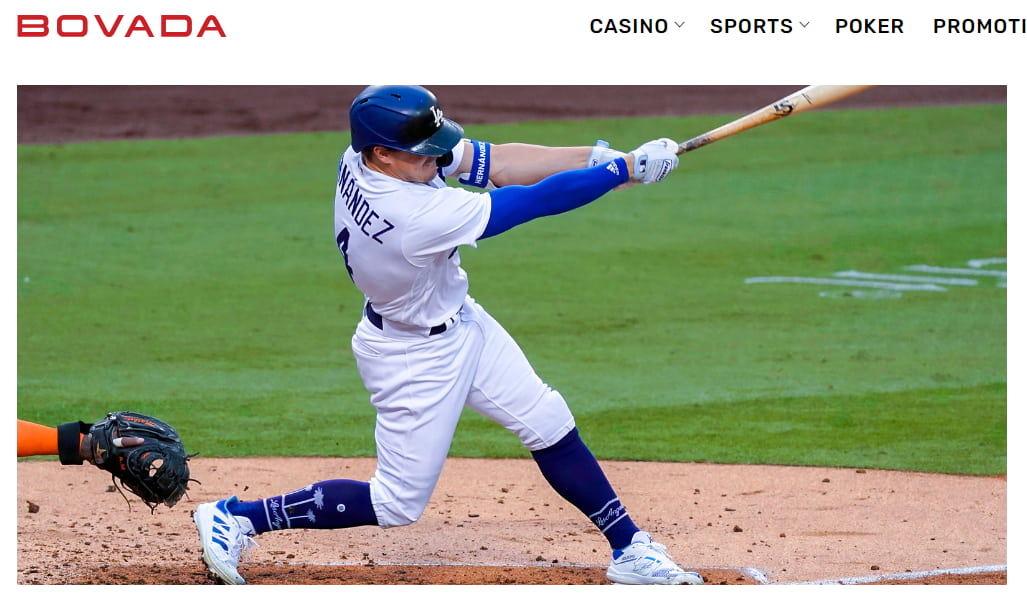
This is just one example. In fact, sports like tennis are also prone to no action as it’s not uncommon for players to retire hurt, which would also void your bet. As such, no action in tennis is fairly common. Golf is another sport that can see no action outcomes as the weather can impact if play goes on.
Now, answering the question, “What does action mean in sports betting?” may lead you to wonder what sports are more reliable when it comes to action. There are a number of other sports where no action outcomes are highly unlikely.
For example, a sport like football will almost never see no action outcomes because it very rarely has cancellations. The sport is played in the rain or snow, so weather is rarely a factor. The squads are large, so injured players are easily replaced for the game to continue.
Sports like soccer , hockey, and basketball are also good examples of sports that will rarely have no action outcomes. As you can see, you’ll almost always have action with most team sports.
If you are still feeling a bit confused by the question of “What does action mean in betting?” then a few tips may help you along. In addition to our betting guides , here are a couple of tips to consider when it comes to placing action bets:
✅ Research the Event: Do your best to research everything about the event you want to bet on, from the weather forecast to team news about injuries. All of this info is vital to ensuring that you place action bets that won’t turn into no action outcomes.
✅ Avoid Prop Bets: Player-specific prop bets can be risky because if that player gets injured, your bet will almost certainly be a no action outcome. Prop bets are fun, but just make sure the players you want to bet on are fit and ready to play. In addition, leaving your prop bets closer to the actual event is a good idea as well.
✅ Focus on Stable Sports: As we mentioned earlier, some sports are more prone to no action outcomes, so try to bet more on sports like football, soccer, hockey , etc.
The terms and conditions of action will vary from online sportsbook to online sportsbook. It’s important that you take the time to check out the fine print on these sites to see how they deal with certain outcomes.
For example, if you bet on certain player props and that player gets injured, many gambling sites will void the bet and refund your stake. However, some offshore sportsbooks may consider a player to still be a part of the active roster if they are on the bench, even if they are unlikely to play. As such, they won’t refund your bet. You need to know these finer details, especially when it comes to player props.
Action and No Action Betting FAQs
Action simply refers to the fact that you have an active wager going. When you place a real money wager on an outcome with a sportsbook, that is considered action betting. It’s a common term used in betting lingo.
Yes, your money will be refunded if a bet is declared no action. For example, a cricket game you bet on was cancelled due to bad weather, in which case the bet is refunded.
Action in baseball is when you have placed a bet on a baseball match. Baseball is interesting as there are chances of no action outcomes if you use listed bets. It’s a great option to have as it gives you more control over your bets.
Action reverse is where the punter combines two or more “if bets” in reverse order. Basically, the first dictates whether the second bet will be placed. With action reverse, you place this bet in both ways, with bet 1 influencing bet 2 and another bet where bet 2 influences bet 1.
This is just a term that refers to punters who are professionals. A sharp also refers to the “smart” bettors that dedicate a ton of their time to strategy and data.
Expert Guides


IMAGES
COMMENTS
One of the best riverboat casinos outside of Louisiana is the Grand Victoria in Elgin, Illinois. Built back in 1995, she was spared the dangers of cruising the Fox River in 1999, when Illinois was one of the last states to end their riverboat gaming rules that required the boats to leave their docks. Today, this 30,000-foot boat has room for ...
Riverboat casino. A riverboat casino is a type of casino on a riverboat found in several states in the United States with frontage on the Mississippi River and its tributaries, or along the Gulf Coast. Several states authorized this type of casino in order to enable gambling but limit the areas where casinos could be constructed; it was a type ...
The Beginning of Riverboat Gambling. For much of the 19th and 20th centuries, paddlewheel riverboats had been used to transport freight and passengers up major river systems and their tributaries. When railroads overtook them in usefulness and popularity, a shift occurred. Riverboats became more frequently used for entertainment excursions.
The Ameristar Casino Vicksburg is one of the oldest and most crowded riverboat casinos in Mississippi with over 50,000 square feet of gaming space. The wide choice of slots, table games, and poker tables is complemented by all kinds of entertainments, from the flavors of a diverse buffet to comedy clubs and nightclubs.
Of course, modern riverboat casinos have been popular since the early 1990s. Iowa was the first state to legalize riverboat gambling, with several states bordering the Mississippi river like Mississippi, Missouri, Illinois, Indiana, and Louisiana jumping on the bandwagon shortly after.
The riverboat casinos that remain today continue that grand tradition, with music playing onboard, restaurants available to players and even live entertainment offered regularly. So, if you want to step back in time and experience the old South by river—without all the outlaws and pirates—consider a riverboat cruise or evening of gaming.
The first one to become a fully recognised legal riverboat casino was in Iowa in 1989. This state, which lies above Missouri, sits on the network of rivers where riverboat gambling was popular in the 19th century. Other states which were also once smitten with riverboats, such as Louisiana and Illinois, jumped on the bandwagon and passed the ...
This classic four-story riverboat looks like it has stepped straight out of a photograph from the turn of the 20 th century. When it is lit up at night, it takes your breath away. At the tables, poker is the order of the day. The casino offers Mississippi stud, 3-card poker and Texas Holdem. There are also 800 slot games, while the Fanduel ...
Riverboat Gambling: Boosting Local Economies and State Budgets. It goes without saying that riverboat gambling had has a positive impact on both local level and state budgets. For example, in Indiana, all casinos have to pay a 20% state tax. Of this, 15% goes to the state and the other 5% remains in the local community.
The first riverboat casinos made money through what is known in the trade as "convenience gambling," meaning people went there solely because it offered gambling close to home. The ability to gamble without traveling to Las Vegas or Atlantic City made up for the fact that typically, one would find slots and table games cramped on several ...
Today, riverboat gambling is legal in six states. Iowa led the way in 1991; Illinois and Louisiana followed in the same year. Mississippi, Indiana and Missouri legalized the activity in 1993. These days, if you want to gamble onboard a vessel in waters bordering any of these six states, you'll need to be 21 years of age or older.
The idea behind riverboat casinos was that it would limit the areas in which casinos could be constructed, enabling gambling but keeping it to specifically designated areas. The fact that the boats were seldom taken away from the dock, or even ever taken away in some cases, didn't change the point that the legal fiction was able to be sold by ...
On riverboats, gambling was far from uncommon. There were card games, slot machines, and more. When states approved riverboat casinos in the late 20 th century, and land-based gaming was generally prohibited, these casinos had to be located on ships. In some areas, gambling was legal only when the boat was not docked, as in the traditional trips.
The first license went to Alton, which launched Illinois' first riverboat casino, the Alton Belle, on Sept. 10, 1991. The three-deck, 600-passenger boat held 296 slot machines and 22 gambling tables. In the first year, riverboat gambling brought in $8 million in tax revenue. The next year, it raked in $54 million, surpassing horseracing revenue.
This riverboat casino opened in 1993, the Hollywood Casino has 53,000 square feet of gaming space. That's room for more than 1,000 slot machines and a host of table game action, including blackjack, mini-baccarat, roulette, and craps. Sports bettors can test their handicapping skills at the Barstool Sportsbook.
Laissez le Bon Temps Roulette: Letting the Good Times Roll on Riverboat Casinos. July 01, 1994. By Adam M Zaretsky. Until 1990, casino gambling was legal only in Nevada and Atlantic City, N.J. Since then, it has been authorized in 23 states, including four in the Eighth Federal Reserve District. In a quest to raise revenues without imposing ...
The Symbolism Exposed. Within "Riverboat Gambler," Carly Simon artfully weaves layers of symbolism, enriching the song with deeper meaning. The riverboat symbolizes the journey of life, floating down the river of fate, stopping at various ports of opportunity and challenges. It encapsulates the uncertain nature of existence, reminding us ...
There is one meaning in OED's entry for the noun riverboat gambling. See 'Meaning & use' for definition, usage, and quotation evidence. How common is the noun riverboat gambling? Fewer than 0.01 occurrences per million words in modern written English.
Home Field Advantage - Refers to the edge that the home team is expected to have. Hit - In Blackjack this can mean for a player to request an additional card and in slots it is gambling terms for winning. House Edge - The probability that the casino will win money and is usually expressed as a percentage.
But I am guessing that it means the odds are stacked against you. And that in the past riverboat gambling was fixed so the house won most of the time. Or maybe a gamble on a riverboat was risky because: "Rich and poor ships also carried the notorious 'Mississippi river gamblers' or 'river gamblers' (both terms common by the late 1840s), ranging ...
After he's opened the safe, Javier will reveal himself as the guard there, and take out the other guard and point his rifle at the Pit Boss. Take the Pit Boss's gun, and go to loot the safe ...
What does the noun riverboat gambler mean? There is one meaning in OED's entry for the noun riverboat gambler. See 'Meaning & use' for definition, usage, and quotation evidence. This word is used in U.S. English. See meaning & use. ... riverboat gambling, n. 1953 ...
What Is 'Action' in Sports Betting? You have heard your friends or people around you refer to "getting in on the action" or "I'll take that action."This stems from sports crypto betting.Here, action simply means that you have a vested interest in the outcome of a match because you have placed a moneyline bet on either one team to win on the betting line or on a specific market.